#i could write an essay about their parallels. this is mental illness guys
Explore tagged Tumblr posts
Text
It's crazy how Lotor and Keith were (in my opinion) the most strongly paralleled characters in the series and they never had a single proper conversation.
#they paralleled eachother. they are the antithesis of eachother. keith succeded where lotor failed. what the fuck im not okay abt them#the only reason the voltron writers kelt them away from eachother until keith confirmed lotor was Evil™️ was bc it wouldve taken one#heartfelt conversation between them for lotors resolve to fucking melt and be dropped kicked into a redemption arc#i could write an essay about their parallels. this is mental illness guys#voltron legendary defender#vld#vld keith#vld lotor
44 notes
·
View notes
Note
hi mac!!!! mentally i am sitting with u on the couch watchin youtube videos w u. i hope ur day was good :3 i had work 2day. did not stop me writing ghostknife!!! i wrote 2k more words in my tumblr drafts over my seven hour shift. im at 8.5k words total now. get my ass out the kitchen im cookin too hard!!!!! THAT ASIDE mac can u gimme some nhw thoughts. i wanna hear about nhw mark winters. tell me abt ur favourite gay depressed blond man!!!!!!!! i wanna hear abt him and what the winters family torment nexus is like in nhw!!!!!! holding out a microphone 2 u the floor is yours 🎤
OKAY . HI. I LOVE TORTURING THAT BLONDE MAN. im going to direct you to the mark winters essay just in case you havent read that one yet because its got context for a lot of what im gonna talk about hehe (beware for worm spoilers, ill make this answer easy 2 understand without context i promise) under the cut bc i tend to ramble about him. oops
god . okay. basis of the entire nhw mark winters character is that he is the most unlucky man in the entire world. like. literally. hes been targeted that way. universe's favorite punching bag. i could make a joke here about being god and such but ill save that for my dnd campaign.
literally. so much bad shit happens to him. and then keeps happening to him. and keeps happening. and he has to be so fucking. emotionally repressed and logical and analytic and focused or else he will go crazy. mark is one of those capes that got powers artificially (overlord forced them on him- parallel to forced experimentation in canon) but the dramatic irony of it all is that even if mark would have gotten his powers naturally through a trigger event... with the way worm powers work he probably wouldve ended up with the same powers anyway. man is a striker/tinker, which comes from "facing an immediate, in-your-face threat, usually a singular object or individual" (indirect danger from simurgh, immediate danger from ashe in his very unstable breaker form immediately after killing his mom) and "solutionless problems over long periods of time, culminating in a crisis moment" (faking his and ashe's deaths in order to escape the quarantine process of simurgh survivors, having to be on the run from any sort of scrutiny for nearly TEN YEARS, eventually resulting in being offered a job working for overlord (a notoriously cruel crime lord)) . i have a lot of feelings about that. mark goes through all of this and never has a trigger event, he gets through it all with his humanity mostly intact. and then he ends up getting powers anyway because hes forced into a corner by a fucking alligator man.
ANYWAYYYYY. the fic im writing rn is from tide's pov and its immediatly after overlords death, where tide finds mark (and a bunch of other people) unconscious in tubes after going through biological experimentation and getting. animal features. this is how mark gets the lizard stuff in this au. anyway since the fic is from tide's pov i want to take a second to talk about what it would be like from marks pov. mark disobeyed one of overlords orders because it would have meant fighting the wards (who ashe . recently joined as part of the team) . overlord does not take this well and punishes him by using him for unethical human experiments. so between that moment and overlords death, mark had been subjected to over a week of near-constant testing and surgery and he was probably awake for a lot of it and. thatll fuck a guy up!!!!! pretty fucking severely!!!!! but in the grand scheme of things a week isnt that much time. which is why his transformation is only minimal and he can still pretty much pass as human with some disguising (some of the other subjects were. not so lucky).
mark was unconscious for the entire overlord fight, so he has no idea what happens. because he was unmasked, the heroes dont recognize him as a villain so instead of going to jail he gets taken to a hospital with all of the other subjects and is basically just treated as a civilian victim. but because nobody knows who he is or his relation to ashe/auxiliary.... nobody. tells him about what happened to overlord. the wards arent as closely involved with mark in this au (and honestly they dont really like him enough to care, they really just know him as "ashe's shitty dad" and thats about it). um. well. the only person who knows his identity and knows his relation is. tide.
working for a supervillain and constantly surviving out of the public's eye for fear that someone might discover your past doesnt leave a lot of room for friends, and his only living family is currently being turned into a puppet by another supervillain (not that he knows this yet) so the only person who really visits him is tide. theyre not friends, theyre not anything to each other, really, but . they KNOW each other. they UNDERSTAND each other in a way that. nobody else in the world would. go read roswells nhw tidalwave post its everything to me . anyway im getting distracted. like i said, over a week of constant unethical experiments and body horror will fuck a guy up. three of his base biological senses/instincts have been SEVERELY messed with (eyesight is fundamentally changed by the heat sense, he cant really thermoregulate well anymore, his balance is completely thrown off by the Addition Of A New Limb) and so that makes it. really hard for him to recover into some sense of lucidity. the next handful of days after he ends up in the hospital are a complete blur of consciousness, any time he opens his eyes hes totally disoriented, hes getting these awful migraines from the strain, he cant control his body heat and it seems like hes always too cold, the scales are fucking itchy, etc etc etc. hes bedridden most of the time because he cant even stand up on his own without support bc he has to get used to the weight of a tail. for those days where he's basically stuck in bed, stuck in his room, etc. he is. bored out of his mind, hes angry, hes scared (ohhh god hes in a hospital did someone do a background check do they know who he is. he hasnt been to a real doctor in over ten years), he doesnt know how much time has passed.
tide happens to visit the first day mark is feeling lucid enough to ask about ashe. this is like. a week or so into his recovery. he overheard one of the staff talking about the date and it made him like. snap awake because he realized hes been away from home and had no way to contact ashe in like. half a month. he cant ask any of the hospital staff about what happened to his son because thats a surefire way of getting a billion questions about his identity. so when tide shows up its immediately like "where is he is someone taking care of him i hate you heroes and everything you stand for but i know hes part of that team now please tell me theyre keeping him safe" and. tide is really really good at keeping a straight face but he just has this Look in his eyes and mark Knows in that moment that every single one of his nighmares is coming true. he tries to leave, tide has to catch him because he still cant walk and hes behaving like a fucking wild animal, hes biting and clawing and just in this rage because why didnt anyone tell me sooner i couldve done something i couldve protected him ("mark, you were basically in a coma" "i dont care") . nobody knows what actually happened to ashe yet. he killed overlord and then just. went missing. nobody saw him leave. they have no lead whatsoever on where he could be (yet) and it drives mark CRAZY dude like. all mark winters knows is grief and rage. eventually the wards are given that hint about where to find him and see him with the trickster and now THEY know, but. again, they dont.. know mark as well. they dont have any reason to go tell him right away. i havent decided yet whether it would be more painful for tide to break this news to him too or if the first time mark sees his son again is . on tv unmasked using his powers in some gaudy outfit he knows ashe would never choose to wear with his hair pulled back out of his face in some intricate braid and. why are his eyes orange . what the fuck happened to him. his wholeeeeee. entire world entire existence just comes crashing down around him .
mark winters universe's most hated man
#this wasnt supposed to be so long. however. u know how it is when i start talking about that shitty fucking blonde man.#hi :]#asks#friends!!!#anachronistic-falsehood#new haven wards
6 notes
·
View notes
Text
finally got around to watching more of S8 and initial Maeve thoughts:
(yes i know her name, i’ve seen gifs of her but i know nothing else so pls don’t spoil)
i am very intrigued, but also confused on how im supposed to feel abt this arrangement.
there’s obviously something more going on than spencer is hiding a ‘girlfriend’
the spencer/alex blake moments about this are so good tho. alex linguistically deducing her way through spencer’s act. and her not sharing spencer’s secret!!
i want to see more of spencer and blake in general
i get that they’re trying to set up this idea that spencer and maeve are connecting on an intellectual level, with them not knowing what the other looks like
but im sorry ‘when i studied the mri you sent me, i said to myself, this is a guy i need to get to know’ is arguably the creepiest thing in an episode where an unsub is cutting off people’s legs
like she looked an image of a brain and was attracted to it?? im exaggerating lol, it’s just a weird image to me
speculations about Maeve’s deal: first thought was she has a stalker/serial killer after her? witness protection?
second, because it’s a Spencer arc... schizophrenia? or some form of a paranoid delusion? Maeve just thinks that someone is after her, and she’s in danger when she isn’t.
none of my theories completely make logical sense. like if she was in witness protection, spencer probably wouldn’t be able to contact her at all. and im not an expert on mental illness, but i don’t think schizophrenia would mean she would have this delusion and be lucid enough to give spencer a geneticist’s opinion on things
they’re definitely setting up a deeper Mystery™️ and im hooked, i just want to know what’s going on!!
also as someone who was deeply obssessed with reading all of Conan Doyle’s works when she was 11, the Sherlock Holmes motif is making me go 👀
Spencer did strike of a Sherlock Holmes-esque character when i first saw him, esp when they made those edits of him big braining his way through a case in s1. He’s a genius with a solid memory, with a knack for deduction and solving crimes.
Personality wise, Spencer and Sherlock are nothing alike, so it’s interesting to see the writers want to draw parallels more overtly now
i mean they did give him a drug problem except you could blink and miss it since they did it so poorly the same way Arthur Conan Doyle gave Sherlock a cocaine addiction
iirc, the book they show Spencer reading, The Sign of Four, was the first time Doyle explicitly shows Sherlock to be an actual drug user. He vividly described him picking up a vial and syringe and shooting himself up. And Holmes justifies it as being only a ‘seven-percent solution’ meant to stave off boredom and escape the world, like it’s not a bad thing.
It makes me wonder how Spencer, a rehabilitated drug addict, would react to reading that scene. idk man, i hope he would’ve somehow gotten a heads up about it!
is Maeve recommending Sherlock Holmes to Spencer because that’s who he reminds her of??
i have half a mind to reread all of Sherlock Holmes, or at least the ones they showed on screen, to write an essay on the thematic significance and any more spencer/sherlock parallels i can find
16 notes
·
View notes
Text
Ciconia no Naku Koro ni Phase 1 : To You, The Replaceable Ones
I had planned to write this… review? analysis? of Ciconia Phase 1 right after finishing the game about two weeks after its release, but since then I've had trouble organizing my thoughts. The reason is that this first installment alone tackles a lot of themes: war, nationalism, technoscientism, media consumption and manipulation, the blurring limits between physical and virtual reality, education systems, generational gaps induced by technology, artificial procreation, old people robbing the youth of their dreams, the meaning of family and interpersonal bonds, and even transidentity (albeit briefly). And it is quite remarkable that almost all of those themes are represented by one object: the Gauntlet and the idea of “parallel processing” associated with it.
It's gonna be a long and messy review, I'll probably forget to mention some aspects of the story or overlook others, and I won't talk about every single character, but I'll try to cover the essential parts. Not easy considering how densely-packed the story is, but let's go!
So to start, I should probably focus on this VN's protagonist, Mitake Miyao. On a surface level, he's a bit of what you'd call a “tsundere”: harsh, a little irritable and sarcastic with his pals, but always well-meaning and easy to befriend in the end. One of the running threads of the story so far is that he's too well-meaning in fact, idealistic to a fault, which contributes to his odd charisma but also makes the increasing realization of his powerlessness all the more depressing. You don't want to see this guy fail, but because of the way the story is framed, you know he inevitably will.
For a while, the narration and dialogue like to repeat that “youngsters are each generation's main characters”, but that's a sentiment I couldn't quite share − in our real world, youngsters may be the ones will all the dreams, but they sure as hell aren't the ones making the decisions. The climate change crisis, for example, wouldn't be left unaddressed if that was the case. And sure enough, Ciconia isn't so naïve as to ignore that reality. Every single step of the way, Miyao thinks he can use his power to overturn the situation. Every single step of the way, he's reminded that in the end he's just a pawn moving however his higher-ups or other nebulous forces wish him to. That's a really powerful and relatable theme in this day and age, which raises the question of how far you can oppose a system you're an essential part of.
One thing that makes Miyao special, at least compared to his pals from the AOU, is that he's “ciconia-born” − born from natural procreation. Which means that unlike Jayden or Gunhild, he has bilogical family bonds but also hasn't been subjected to a genetic selection that would predetermine his path in life. At least supposedly, but we gradually learn that that may not quite be the case. In fact, that biological link to Toujirou ends up acting as a tether that robs Miyao of even more control on his own life than he thought, leading to the final tragedy of this first Phase.
There also lies this story's commentary on technology and man's increasing dependence on it − technology makes the kids' life easier, but it's also their undoing. One technology prevented an apocalypse that another caused, and the loss of the former brings about a new apocalypse. Humans created the 8MS but only a handful of scientists have a full understanding of how it works, just like today's technology are only fully understood by a small elite of technicians. We are increasingly dependent on tools whose principles are increasingly out of our grasp. Again, the Gauntlet is another reflection of that.
But back to Miyao and the Gauntlet Knights. In retrospect, it is clear that the way both the characters and readers learn about most dramatic developments through disincarnated news reports (with a goofy “news flash” alert by the frog AI Keropoyo to make it worse) is meant to build up that feeling of powerlessness, and also of disconnect. We should be alarmed that war is approaching, that terrible things are happening… but it all feels distant. After all, do you cry or tremble in fear when you learn that an eathquake killed a thousand people on the other side of the globe? No, you'll think “it's terrible” for a minute and then move on, because what can you do about it? Reading the second half of Ciconia felt a lot like that. And while that's part of the message, it is also to the detriment of the reading experience a lot of the time.
For a while (around the 60-to-80% portion of the game, roughly) we get a lot of redundant dialogue about commenting the news and Miyao rambling on about how they're all COMRADES MAINTAINING THE WALLS OF PEACE, again and again and again, to the point it becomes annoying. That's my only real gripe with the game − the feeling that, at times, Ryukishi forgot he was writing a story and went into political or philosophical essays about its themes instead. Maybe a manga or anime adaptation could help make these parts more… show-don't-telly. But as it is, it could have used some serious trimming down. That's hardly something entirely new − who can forget Krauss' tangent about 1986 Japan's economic situation or Beatrice's explanation of Hempel's crow? But in Ciconia the narration doesn't seem to come from any specific point of view except that of the author (and even on that front, the opening disclaimer warns us that the views expressed don't necessarily reflect the author's opinions), so those parts become all the more conspicuous. Unless this all turns out to be part of a Witch's game, which wouldn't be surprising.
Where Ciconia shines however, is at weaving a web of connections between the characters, one by one, to make you care about some and suspicious of others, sometimes both, and deliberately confuse you about who really controls whom. First we have the kids, with Warcat and Grave Mole which instantly grew on me (the slice-of-life TIPS focused on them had some of my favorite scenes actually), then the other kette with their own quirky charms… then the “villains”, with Toujirou and Seshat, then the Three Kings and Jestress who has a delightful dynamic with Toujirou, and then Toujirou is revealed to be Miyao's father, etc... It's a testament to how well all of those characters are established that I could remember almost all of them very quickly despite their massive number. Save for the Cairo Squad maybe. They're just kinda there. The (mostly) gorgeous character designs certainly help, even if Ryukishi still has a somewhat loose grasp of body proportions and of the… number of fingers on human hands. There's some improvement even in that department though.
While Miyao is for the most part the center of the cast, at least on the kids' side, that doesn't mean the others aren't interesting in their own right. Jayden is your classic “best buddy dudebro” whose easygoingness lets him bounce off Miyao's more strait-laced personality in a fun way, but his relationship with Meow, Miyao's “little sister” who shares the same body, allows him to show more sensitivity and shyness he would otherwise have. Speaking of Meow, she brings about another interesting element of worldbuilding − the existence of “Congenital Parallel Processors”, or CPPs, i.e. people born with multiple personalities, who are not considered mentally ill but a full-fledged minority with its own issues and “coming outs”. Although that aspect isn't developped much (Meow herself kind of disappears from the radar in the second half), we do get other examples of how it can manifest, notably with the character of Naima, whose unnamed alter-ego is violently protective of her, or Rukshana who's prone to abrupt personality changes when she laughs. The way Jayden kinda walks on eggs but genuinely tris to to treat Meow as her as her own person while respecting her and Miyao's privacy is frankly adorable, and I almost wish we got more of that at least in the TIPs!
The kette I found the most interesting, though, was Grave Mole, composed of Chloe, Lilja and Koshka. While a lot of characters have issues, all three of these girls are complete mental wrecks to some degree. Koshka spends her time between grumpily taking part in Kizuna chat rooms and horrific body experiments (usually simultaneously) when she's not training, Lilja has to take drugs to pretend like she's a happy, cute and mischievous cat-girl for the sake of making Koshka a more-or-less functional human being, and Chloe has to constantly deal with unfair punishments and a constantly battered self-esteem. As comedic as Okonogi's angry rants and karate-chops are played (and as much as I like this version of Okonogi, strangely enough), that scene where she gleefully lets Lilja be killed in battle makes it clear that her mental state is just as unstable as the other two's.
On the antagonists' side, things are a lot more blurry: a lot of them utter the arc phrase “All is in the name of guiding humanity down the right path.” However, what the right path is seems to vary depending on who says it. That's where a lot of the mystery lies − be it with Jestress, Seshat or Toushirou, their goals seem contradictory, and Tak… I mean Vier Dreissig doesn't even seem to have a goal beyond SCIENCE. But a big part of Phase 1's hook is that constant uncertainty as to who is playing whom and for what purpose. Even the Three Kings, who seem like your bog standard Illuminati knock-offs, might not be as much in control as they seem − hell, one of the big catastrophes (the fatal damage to the atmospheric 8MS) happens completely outside of their control, in an almost comically sudden way.
Speaking of comical… let's get to what I found personally fascinating but what other readers might have gripes with: the brutal tonal shifts and dissonances throughout the story. A cheery scene to announce the big success of a plan for the Order of the Public Bath? Keropoyo pops up to gleefully announce… an avalanche of terrible news that make the success from a minute ago meaningless. A big conference for peace where World War IV will most certainly be stopped? All of its participant die in an “accidental” explosion. Not to mention characters that are walking balls of tone dissonance like Chloe (who has many comical scenes but is clearly broken beyond repair) or the Yeladot Shavit girls (who by the end are forced to spew out fanatical bullshit with the same sparkly smile they sport when gushing about yuri ships).
This is of course embodied by the incredible climax where all the Gauntlet Knights celebrate their comraderie together in a virtual room… while their real selves are busy killing each other lest they're court-martialed for treason. The moment where all of Miyao's ideals are brutally trashed and scattered in a battle we don't even know the purpose of. The moment where the kids' taent for “parallel processing” becomes their sole mean of escaping the horror of their situation. The moment where all the absurdity, all the unfairness explodes in a depressing flourish. The moment also where the thematic resonance with Umineko becomes fully apparent − how can we not be reminded of Sayo and Maria escaping their shitty lives through their magic? Though of course Rose Guns Days also constantly came to mind, with the focus on war and nationalism, Japan being divided between a union led by the US and one led by China, and two of Miyao's closest friends being the American Jayden and the Chinese Lingji; as well as Miyao being an idealistic and charismatic leader-by-circumstance whose dreams crash into a wall much like Rose's in RGD.
So…
All in all, Ciconia might not entirely be what I expected from a When They Cry game, but it is certainly what I expect from a 07th Expansion game: a thought-provoking experience. Again, I finished my reading shocked and confused. Although it might seem like it shows its cards more explicitly than the openers of Higurashi and Umineko, deception still plays a big part in the story, even if the interaction with the reader is less direct.
Now there might be no murder mystery for the reader to solve, but that won't stop me from speculating! The invisible turning point to me is the “Proof of a Program” chapter, where Blue Miyao tells Miyao that he'll show him someone's face, and that that will activate Miyao's murder program instantly. Miyao first laughs it off, but then the scene brutally cuts to something that might be a flashback, a flash-forward or a nightmare, maybe all of that at once… The most graphically horrifying scene of the entire game, to the point it's almost at odds with the rest. And then… it's never mentioned again. Not even when Miyao meets again with Blue Miyao. Like it never happened. My theory is that everything Miyao experiences from that point onward is some kind of simulation, and that's where the obligatory When They Cry time loop will come from this time. See you in May for the answer?
That is all for today, folks!
12 notes
·
View notes
Note
do you have any theories about what pandora was like before it became populated by humans/taken over by corporations/etc.? i think all the giant skeletons scattered throughout the world and dried up areas that were once oceans are super cool but we don't have much info on pandora's history which makes me :/
Oh boy, I actually think about this all the time? I love natural history topics and speculating about the Eridians.
(I accidentally wrote a small essay and I’m putting it under a cut and I didn’t edit at all so hopefully this is remotely readable)
Okay so Sanctuary has apparently been in the ground for a few centuries so people have apparently been on Pandora for quite some time? Pandora has some wacky shit going on with seasons and rapidly changing environments, which would explain a lot of those giant skeletons. Places like Oasis seem to have only dried up a relatively short period ago (Judging by the Pierfest signs it’s probably been less than a hundred years? It seems implied that it was surrounded by ocean only few years ago, but it also could have been dry for much longer and they just had another water source that gave out?), and the Southern Shelf is confirmed to have frozen less than 5 earth years before BL2.
I think it’s pretty likely that over the course of Pandora seasons (idk if it’s still canon but I think in the first game it was said that a Pandoran year lasts 10 Earth years?) the environment just rapidly changes and this is the main cause of the death for these giant fish, skags, and lizard-looking things.
That said, I feel like those giant skeletons are pretty old partially because that supports my “Decomposition is broken on Pandora” theory (I know a lot of video games tend to just occasionally just ignore logical decomposition, but Borderlands does it SO MUCH and to such a extreme degree? Plus I think it makes for interesting world-building if on Pandora the organisms that facilitate faster decomposition don’t survive well or the eridium in the atmosphere acts as a preservative, and bodies instead are mainly broken down by larger scavengers. I hold this theory so close to my heart).
Maybe they age from a time similar to back when earth had dinosaurs? Like the biggest modern skags we see are skagzilla and Dukino’s mom and they’re still smaller than some of these skags. Or maybe even now there’s just occasionally Skags that big, and they just grown indefinitely provided they have enough food. There’s probably still some massive fucking fish in Pandora’s oceans because I think the ocean needs to be at least 10 times scarier than the land as a rule.
But yeah I guess that’s what I’ve got for the environmental side of things.
Eridian side, though, oh boy.
Eridians were so stupidly technologically advanced that they very well could have created the entire damned planet and bio-engineered all the life on it (perhaps experimentally, to play god for the fun of it, or maybe the life itself acts as some kind of power source?). Which makes sense, for one, the inside of Elpis is pretty chock full of Eridian stuff, maybe it wasn’t built in there, but instead built along with the rest of Elpis? And secondly why the heck else would there be so much goddamn Eridium- their power source- in Pandora? I honestly don’t think eridium is naturally occurring. An idea that also lends itself to the idea that the Eridians were SUPER FUCKED UP?
Okay like we’re really not given a lot to go off of regarding their society or pretty much, anything about them? So I’m using literary parallels to come up with my own, possibly completely wild theories.
By literary parallels, I mean that racist piece of shit, HP Lovecraft (who, admittedly, has a lot to draw on when it comes to sci fi, and tbh it’s always nice to see his works taken and reshaped into something better, with messages he would have hated):
-Ancient advanced alien race. Mysteriously wiped out without a trace (except maybe not) (also I did not mean for that to rhyme)
-Eridium drives people insane. IMO I don’t think this is mental illness or from damage to the brain (partially wishful thinking because, obviously, making the mentally ill folk the ones running around with buzzaxes screaming about murder and attacking people is just bad). I think there’s something sinister behind eridium. Those voices you hear when Krieg goes into Release the Beast might not all be from his brain? Maybe Eridium has a life of its own? Maybe this is some “soylent green is people” shit except with eridians?
-Eridians were very clearly warlike. Most of what remains of their civilization besides the ruins are weapons. Either they fought among themselves or against another alien species? If the latter, they really obliterated them to the point we have no evidence of them, (but tbh it seems fitting). It seems to me they were conquerers, and the now human-inhabited planets were once their empire.
-Also okay the Destroyer just looks like a lot of depictions of Yog-Sothoth
-They seem to have been religious? All of their ruins resemble temples or shrines. Heck, there’s even an element of blood sacrifice, considering the Vault in Badass Crater?
-This isn’t necessarily canon, but I think it’s an interesting thing to consider: In the Tannis comic she mentions they had some real fucked up math system where they could “count in six directions” and stuff. And they’re language has no word for “year” or “time”.
-Heck, Tannis, the one who knows the most about this stuff, is also insane. That’s pretty thematically in-line with Lovecraft.
There’s two of Lovecraft’s creations that I feel like it’s easy to draw parallels to with the Eridians?
-Elder Things: Alien creatures who resided on earth long before humans. They were ridiculously technologically advanced, warred against other aliens, and capable of creating other lifeforms via bioengineering. One such lifeform was the Shoggoth, an originally nonsentient creature intended to serve the Elder Things. Over time this creature evolved and rebelled against their former masters, playing a huge role in their extinction. The Eridians also could have easily been wiped out by their own creations, whether the Guardians, or a Vault monster?
-The Great Race of Yith: Also extremely technologically advanced alien creatures that inhabited earth a longass time ago. These guys are continuously traveling through time via swapping their consciousnesses with beings from other time periods, in an effort to escape their doom. Now, I don’t think the Eridians had that ability (though hey, maybe they did and instead of the Guardians only being creations they were formerly host to Eridian minds? They’re so goddamned mysterious I’m willing to entertain anything), but it seems entirely possible (Maybe even probable, considering The Watcher’s warnings) that they’re capable of time travel and could have not gone extinct at all, just fled through time. Maybe the human race is finally catching up to their point of re-entry into the time stream, or they’re about to encounter whatever it was the Eridians were fleeing.
Heck maybe the Eridians themselves are what the Watcher is warning them about, and the Watcher is betraying their own race (or maybe they’re not actually an Eridian at all, and maybe everything we think we know about how they look is wrong. Like I said, we super don’t have a lot of concrete information and also I love to speculate on everything).
Actually, I could probably write an entire other list of theories based on greek mythology parallels. I won’t but the name “Eridian” presumably comes from I won’t, but I’ll mention the name “Eridian” presumably comes from “Eris” (fittingly, what with all the bloodshed surrounding the Vaults).
TL:DR I feel like the Eridians were probably super bad dudes and/or pulled an Icarus and wiped themselves out with their own creations. They also probably have some sinister Eldritch god shit going on.
They may have built Pandora and Elpis, partially just as a place to keep their superweapons?
22 notes
·
View notes
Note
ok sorry adding onto this im not done. i also wanted to parallel eichi (since tatsumi is kinda like reimeis eichi yknow) but instead of being stopped by outside forces, hes stopped by himself, by going too far and suffering the consequences. and we know tatsumi feels so much guilt over what he did and what happened to kaname but i just wonder what really made him change yknow? probably a lot of time to reflect in the hospital and also just like…hes a teenager yknow teenagers do insane things even when they arent mentally ill and heavily religious (though like, tatsumi is so fucking funny the way hes like no yeah im in training to be a priest. also i dont believe in god). tatsumi to me is just so interesting because i think in a way he sees redemption through alkaloid (and mayoi specifically in this fic, and sometimes in canon but i exaggerated it a bit more for this). i love to think about mayoi and his depth like i could write a whole fucking essay on that guy but a lot of tatsumayo fics kind of follow a similar formula (which isnt a bad thing! i totally understand it lol) of mayoi spiralling and tatsumi helping. definitely not bad at all but like…tatsumi is literally so insane and weird (i love him) and i think it kinda goes under peoples radar sometimes because he has such a gentle disposition? so i wanted to try and dig around tatsumis mind for a bit and extrapolate on some ideas canon brought up, theorize a little on the way the guy works, and honestly just write something with cool imagery. id love to do a mayoi piece sometime too…these guys just kinda fuck me up (all of alkaloid does really but these 2 are some of my favorites)
SENDING AN ASK TO LET YOU KNOW I AM STILL THINKING ABOUT GRAVITATION AND OBSESSION AS WAYS TO DESCRIBE DESIRE. (I loved the tatsumayo fic thank you it was amazing) the way tatsumi speaks + the specific phrasing of the "take him to the top" part is so good thank you 💕
ouufkshrhfk tyyyyy with this fic i really wanted to like…explore the way that desire is not always a kind thing. not even necessarily romantic desire, but desire for success, companionship, ability. i think one thing that bugs me in fics is when desire for someone is only expressed as the positives, as like a ‘all she thinks about is holding her hand, and wanting to kiss her, and just all these lovely saccharine things’ as if wanting someone is only that? i really like to dig deeper, especially with someone like tatsumi, who i think his desires for people mix heavily with his ambitions, and i also think tatsumi, a man who was raised christian/catholic (I CANT REMEMBER RIGHT NOW AUGH) would already have a negative relationship with desire, but to add particularly strong feelings of possession to the mix creates a sort of cocktail of fucked up lol. i saw a comment describe the tatsumi i wrote as bpd, and while it wasnt intentional, i would love to see what someone with bpd thinks of the way i wrote him. sorry for rambling lol i just have a lot of thoughts about this fic and tatsumi and specifically how i wanted him to parallel mayoi in it. ough i could talk about it for hours you opened a floodgate in meeee
12 notes
·
View notes
Text
Re-watching Joker Game: Ep 12 XX Double Cross
So, as I proposed a re-watching, here I go continuing on doing the re-watching. Hopefully someone else will join! ^_-
Also, hopefully there’s someone out there that read all this stuff… as I know it’s pretty long… shame on me for analyzing things too in deep…
Mind you, what follows are my ramblings over Ep 12, comprehensive of my impression on how the frames were structured and so on with some occasional reference to the other Joker Game media.
Also, for personal comfort, I’ll use the characters’ names even if the anime hasn’t stated them yet. In short, as this is a re-watching and not a first watching, you’ll also get a telling that’s mixed with my knowledge of the future. Consider yourself warned.
And now, let’s start.
And we’ll start with a change compared to my previous ramblings for the previous episodes.
Instead than waiting for Ep 11 to comment the preview for this episode, I’ll do it here as otherwise it would be a random unconnected bit at the end of Ep 11. The same will go for future previews.
Now, the preview, as the one for Ep 2, takes part in an… unknown place with plenty of square tables. From the various previews we’ll see people go here often to drink, smoke, play chess, play cards, even eating. The tables and the chandeliers in it are slightly different from the ones in the D Agency kitchen so it’s a different place. It bears a resemblance with the place in which the spies go drinking together in a recent illustration. As Gamo could get in, we can speculate it’s outside D Agency (though the fact he had two chance meetings with two different spies, Odagiri and Jitsui, feels a little odd so it feels more like it’s just an out of canon thing).
Anyway, back to the preview’s plot. We’ve Amari and Odagiri drinking together. Odagiri starts the discussion commenting he heard Amari broke up with his woman again. Amari confirms and from Amari’s reply we can figure out that Amari didn’t break up with THE SAME WOMAN again but that this woman is just the last of a long list. Amari claims there’s no point in remaining with a woman for too long… which makes him sound like a jerk… but there’s to remember the D Agency boys can’t get attached to someone and this will be the core of Odagiri’s episode. Amari is acting like he’s expected to act. His relationships don’t last long because they aren’t expected to. He’s not supposed to find a girlfriend and remain with her.
Odagiri won’t openly express agreement or disapprobation but we can have the feeling he’s not really that comfortable with this and this is Odagiri’s problem. He doesn’t like how the others can manage to remain completely unconnected, nor he’s capable to do the same. In the preview, to Amari’s reply, he comments ‘We’re all beautiful in passing’ but he’s quoting someone and he’s doing so while staring to his own glass, the wine in it reflecting his image and actually, it’s his image we see talking and not him. All visually hints at how Odagiri isn’t reporting his own thoughts but what he’s saying is just… a fakade.
And now let’s dig into the episode.
We start with what looks like a blizzard… which nicely ties with how snow was also falling in the previous episode. Only it gets obvious soon that the two aren’t placed in the same time period or in the same place as, after showing us a line of people walking in the snow…

…we will soon realize those aren’t Germans but Japanese soldiers, and that their uniform is the one worn PRIOR to the Joker Game episode (which dated 1939) so we’ve to be in 1938 or prior to it.
Thanks to the novel (and to @kyuukancorbie who provided me with info about the novel ^_-) we can actually speculate we’re in September, 1936, watching a scene from the large scale Army maneuver in Sapporo.
The camera focus on the face of a soldier. It’s clear enough he’s not feeling well, that he’s ill and that needs to be supported by another soldier to stand. As we watch the face of this poor soldier, a face unfamiliar to us, someone, clearly a superior officer, is scolding him for ‘the way he acts when he receives an order’.

Why it’s a smart choice? The soldier isn’t obeying and this is bad… but the audience is brought to immediately side with him. We see he’s not feeling well, that he can’t stand on his own, it’s clear that the guy scolding him is asking him too much. Psychologically we’ve already decided his superior officer is the ‘bad guy’ and the anime will continue to work on enforcing this idea (LOL, situation will tie some nice parallels with Ep 1 in which we were helped to figure out immediately that Gordon was the bad guy, actually this episode will parallel Ep 1-2 more often than not, I could almost write an essay about this…).
The camera now pans on the whole soldier’s body, starting from bottom and moving toward the top.
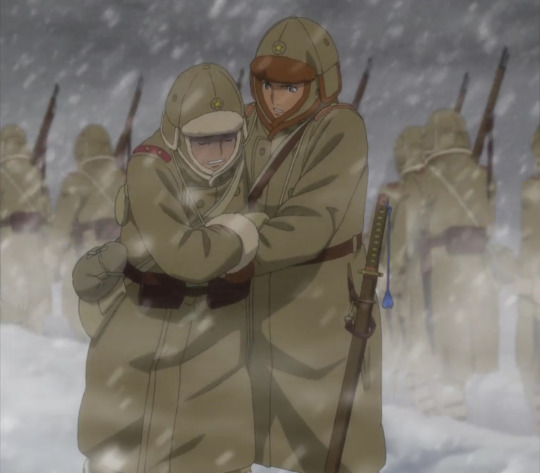
Yes, he’s being supported by another soldier as he can’t stand on his own (don’t you feel sorry for him? Isn’t the one yelling at him a jerk? That’s the hidden message in the whole thing) and it turns out that the one supporting him has a familiar face… though his skin is a lot more tanned so one might not recognize him (evidently he doesn’t usually stay in that cold but was moved there from someplace sunnier) and it doesn’t help that the coat he’s wearing covers most of his head. Anyway guys let’s say hello to young Odagiri.
The scolding voice, which clearly doesn’t belong to Odagiri, goes around talking about how this is for their motherland and that the sick soldier should be content to die for the sake of it, yadda, yadda.
We don’t see the one doing the scolding. He’s just a voice for now, our visual attention is focused on the soldier that’s being sick, on how cruel can sound such words as they’re being said to someone who can’t even stand on his own. Not seeing the speaker is also meaningful because the speaker isn’t just saying his own thoughts. His words are the standard words a superior officer would say to a soldier in such conditions. We don’t really need to see him or to imagine him. Everyone will do, because every superior officer was supposed to say such things.
And here Odagiri speaks up. He seems the voice of reason to us and to our modern mentality but, back then, what he said was probably sounding like heresy. Odagiri complains it seems silly to him to die for what’s just an exercise and that the sick soldier isn’t fit to be a scout.
Sadly, while Odagiri’s words well embrace the modern mentality, back in the past soldiers were an expendable commodity for superior officers. We saw it previously, with Mutō planning to sacrifice Sakuma so as to cover up his mistake and get rid of D Agency. Sakuma was still willing to put up with it and commit Harakiri even if he knew he was being used and, in the novel, he’ll realize his disliking for being used as a pawn isn’t fit for a soldier (the anime will let us believe he’s all right with rejecting the idea… when in the original version he knew it was a thought that wasn’t acceptable for a soldier to have).
So, predictably, Odagiri gets scolded… and, while he’s scolded we hear the officer calling him by his true name. Well, surname. Tobisaki. Which in the novel was merely a name he took for a job. But well, let’s go on. We still don’t see the one doing the scolding, but we see Odagiri’s face shifting when he’s accused of claiming his superior’s orders are ‘foolish’. He figured he made a misstep but it’s too late to take it back.
And we continue with the parallels with Gordon in Ep 1. Remember how they made him look threatening by showing us his yelling mouth with his teeth well visible? Well, guess what? They do the same with Odagiri’s superior’s officer. Close up of his yelling mouth with teeth well visible.

Let’s face it, the visual is telling us this guy is going to bite someone and therefore he’s dangerous and, in short, bad.
You don’t even need to hear what he’s saying. Even if you don’t know Japanese and turns off the subs, it’s clear that this guy, who’s yelling to a sick soldier and to the one supporting the sick soldier, is a jerk.
Also, note the background. Not only the snow is heavily falling and the wind is blowing but the other soldiers are continuing to march. They don’t even dare to turn to watch what’s going on. And the sick soldier is too sick to do anything. The core of the scene is Odagiri. Fundamentally our eyes are focused on him. He’s alone here. The other soldiers are background. The sick soldier is so sick he could as well not be there. And his superior officer isn’t shown.
We’re pushed to focus solely on Odagiri. And now, when the superior officer becomes visible and rips the sick soldier away from Odagiri’s supporting arms, we’re all supposed to react like Odagiri. Get out from the frame, you jerk. We’d like to push him away… like Odagiri does. But this is a luxury Odagiri wasn’t allowed to have.
‘Gyakusei’ [虐政 Oppression] starts being played in the background and the title is rather fitting.
He only pushed away the superior officer and caused him to fall on his ass in the snow… but this is a crime in the Army. We see that now all the soldiers are stopped and staring at him. Even if we’ve no idea how the Army work, this is visually enough to let us figure out that Odagiri has committed something like a capital sin.

Even the superior officer (the credits refers to him as Dai taichō 大隊長 “Commander” but his grades are the ones of a Major…) seems to be shocked… his reaction almost unnatural as Odagiri has merely pushed him, it’s not like he’d tried to kill him… and all this helps to deliver how terrible it is what Odagiri did. Odagiri wasn’t supposed to react at all. Like Sakuma with Mutō, he was merely supposed to bow to his superior’s will.
Also, the fact that the man is finally shown, is a hint he’s actually going to become ‘relevant’ in the story, that we won’t be able to ignore him any longer, in fact, the next that happens is that Odagiri’s superior officer goes into a rage, his face getting red and his expression furious in an almost comical manner. This means he’s going to cause troubles, troubles Odagiri can’t avoid.
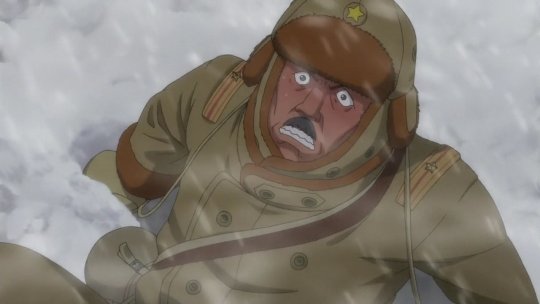
Meanwhile poor Odagiri is gazing at him in shock, which is a clear hint he acted out of instinct and not out of will to be disrespectful or to attack the other, the sick soldier lying limp in his arm, a clear hint that Odagiri was right, that poor guy couldn’t take anymore, they would have killed him if they had continued to force him to go on. In short the visual is all for supporting Odagiri’s side… as we hear his superior officer ordering to grab Odagiri because he ‘used violence against a superior officer (he gave him a slight push) and refused to obey (insane and cruel) orders’.
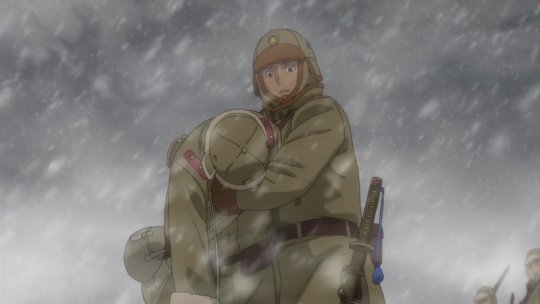
As the officer yells and waves his arm in emphasis, Odagiri evidently grasps the gravity of what he has done as he let his companion go and that one slumps on the ground, either unconscious or unable to support himself, while everyone else is standing still, watching the scene.

There’s to say the anime pulls out beautifully how really, the superior officer’s insistence for the soldier to obey order was asinine, the guy couldn’t move anymore, asking him to keep on going was really asking him to die for a training exercise, and how, despite this, for the Army, Odagiri’s tiny action of disobedience that was meant only to protect a companion and not to really hurt the officer, was so very grave that everyone is standing still around him in shock. The world had stopped around Odagiri because he had slightly pushed a superior officer.
A digression here. Well, two.
First. In this bit we could hear Odagiri talking. I’m not knowledgeable in Japanese but here, his manner of talking and his tone feels different from how he usually talk, he’s more similar to how Sakuma talked with Mutō. In short, he’s sounding like a soldier and therefore he changes his tone.
Second. The superior officer. Admire his design and the manner he moves. He’s ugly, shorter than Odagiri and since he’s wearing a coat this makes him seem even larger. He’s unimpressive and his reaction, which seems a huge overreaction, makes him almost ridicule. He seems a child throwing a tantrum. It’s clear he’s being unreasonable and making a fuss over nothing. This subtly increases the sympathy a viewer is meant to feel for Odagiri a lot. Fundamentally they constructed Odagiri’s superior officer so that we would feel like siding with Odagiri.
And now let’s go on.
The scene changes and the next with see is a construction likely made with wood. It’s not snowing any more but the roof is covered in snow and ice. Either it’s a jail or it just hosts a cell. Anyway, inside the cell, there’s poor Odagiri. They had taken away his coat and he’s wrapped in a cover, trembling, seated on the floor and curled up on himself, his face buried in his knees. He’s just trembling but, since we can’t see his face, we might even been lead to think he’s crying. He’s a miserable thing and I’m sorry for him.
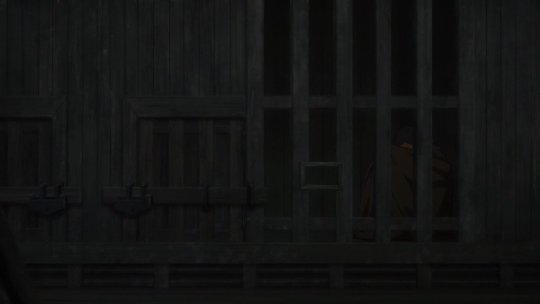
Then, just outside the cell, a familiar cane held by a familiar white gloved hand appears. Yeah, this is Ep 12, and the anime by now know that we can recognize Yūki by his fake distinctive trait.
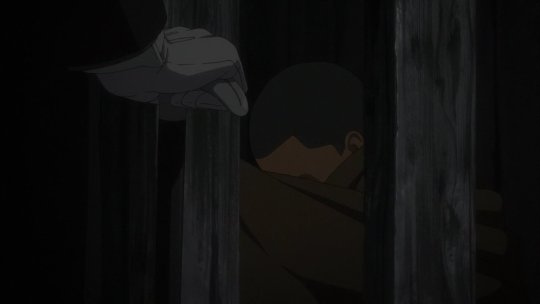
Yūki asks Odagiri if he’s the one called ‘untrainable’. Because yes, if you take sides with a poor companion against an insane superior officer all of sudden you’re untrainable even if you’ve managed to reach the grade of second lieutenant.
In reply Odagiri raises his head a tiny bit, enough to allow us to see his eye. We can see that no, he wasn’t crying and now he’s frowning hard at Yūki. Even though he has said nothing, it’s clear he doesn’t trust him.
Yūki asks him what he plans to do when he leaves the Army… because I take they’re kicking Odagiri out. Odagiri looks away… and the poor guy seems a little lost… and here I’ve to compliment the guys drawing the scene because we really see little of Odagiri yet they managed to give to that little we see ‘feelings’ it could transmit to us. Also, his cheeks seem a little sunken… did they fed Odagiri while they were holding him prisoner?
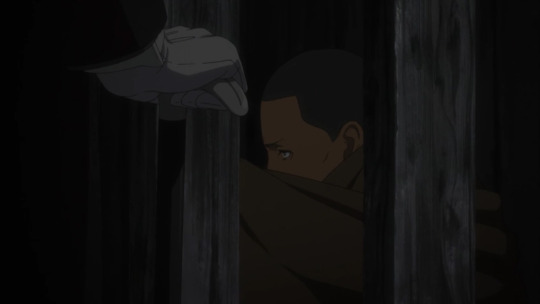
Odagiri comments that’s a good question and that he could move to Manchuria and become a roving bandit. From this answer we can guess how lost Odagiri is. Out of the Army he has no place to return if he’s considering to move to Manchuria to become a bandit.
The camera now shows, in reply to Odagiri’s answer, Yūki’s grinning mouth.
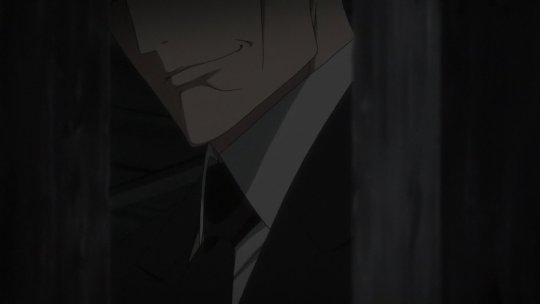
Note that we hadn’t seen his full face yet, but who cares, we know it’s him… yet at the same time, the fact his face was hidden to the view, is meant to give us another info. Odagiri doesn’t know this man. Yūki’s ‘lack of face’ is a hint that he’s unknown to Odagiri. Anyway at this Yūki smiles, moves closer and crouches down so as to speak close to Odagiri’s ear.

What Yūki tells him is basically an invitation to try to take his exam (of admission to his spy school).
A time break here. If the incident with the soldier happened in September 1936, there’s to remember D Agency was founded in Autumn 1937 (though its foundation was proposed in 1935). Sakuma joins D Agency in 1938, and watches the guys as they take their entrance exams as well as they trained there. So this should mean some time has gone by the incident and Odagiri’s meeting with Yūki… or Yūki is just preparing his moves knowing they’ll have to allow him to open D Agency. Who knows?
Now… Odagiri clearly had outstanding abilities as he managed to handle Yūki’s training (and the novel says he always graduates first place from his schools… which makes me think Sakuma should be older as they apparently don’t know each other yet Odagiri, being so good, should have been sort of noticeable if he were of his same age). Odagiri is also the one who decides to leave the school, it’s not Yūki that kicks him out. But what I wonder is ‘how did Yūki found him?’ Was he keeping an eye on the untrainable soldiers that were in the Army? To Odagiri in particular because he was pretty good at school? Does this mean that in the Joker Game universe it was Yūki who personally searched for candidates for his school? Did Miyoshi and the other meet Yūki and received the same proposition? Was Yūki searching for a certain type of people in particular? Were they all ‘broken’, rejected by their family, hence they’ve no problems to live completely disconnected by the others?
Anyway, at Yūki’s words, Odagiri looks at Yūki, really looks at him for the first time and we finally see Yūki’s face. Well, not the whole of it but enough of it to say we’re looking at Yūki’s face. Because yes, the visual is telling us now Odagiri is starting to be interested in Yūki and knowing him.

‘Kikan’ [機関 Agency] starts and we gets Odagiri telling us the same shortened version of Sakuma’s explanation of what D Agency is that he gave us in Ep 1. It’s worth to remember this summarized version is the version we hear at the beginning of each episode, each time said by a different spy.
Then this ends and we get…
…the opening. There’s not really anything to mention about it as it’s the same Opening we saw in the past. Odagiri is the third spy that appears in it and he’s walking with his hands in his pockets. Around the end of the opening we also see him removing the headphones he was wearing and that, were apparently, part of a machine to send messages.
Anyway the opening ends and we resume with ‘Joker Game’.
We start… with a scream. What we see (the first floor of a house) is clearly through the lenses of binoculars, a hint we’re watching things from the point of view of someone keeping under surveillance the place. The binoculars focuses on the woman who has just screamed and that was watching something inside an apartment through the open door before running away.

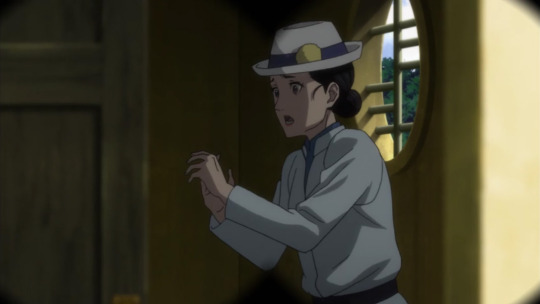
Next we see Odagiri removing the binoculars from his face with a surprised expression. Yes, he was the one keeping the place under surveillance. It’s interesting how the visual shows he was pecking from two curtains, another hint that no, he didn’t just happen to watch out with a binoculars, he was pecking at the house secretly.
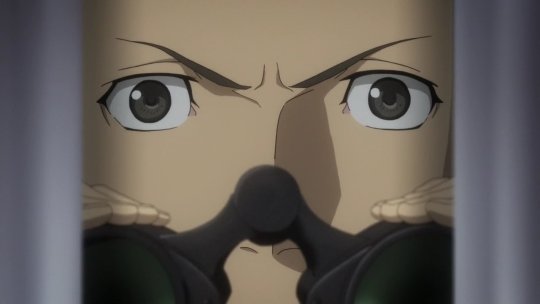
The girl who had screamed meanwhile is calling for the police running through the street and under a house. As she passes in front of it, we can see that one is the house in which Odagiri was. Odagiri’s gaze focuses on her. He frowns then returns his attention on the house.
‘Suiri’ [推理 Reasoning] starts being played.
Note how, so far, we’ve seen Odagiri focusing on the girl. We could almost think she was his target when actually it was the guy inside the house. While Odagiri’s actions can seem normal, I’ve the feeling they’re a mistake for a spy as, in order to look at the girl, he’s not focusing on his target’s house.
The scene changes (though the musical background remains the same) and we’re in an apartment. There’s another girl sitting on the floor with an apparently shocked expression and there’s curious peeking from the door, near to which there’s a flower vase with, in it many camomile flowers, the ones Schneider bought.
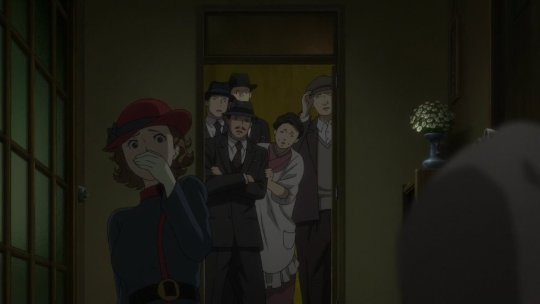
We can’t see what they’re watching though we can guess something terrible has happened and this is good to keep the suspense but also because we, as viewers, more or less end up on having the same amount of info on the scene that Odagiri is having at the same time in which he’s having it. So, when Odagiri appears on the door as well and pecks inside, finally, we’re also allowed to see what’s happened inside. There’s a dead man lying on the floor and a note on the table. It’s in German but says ‘I’ve lost all hope. I want to die.’
We’re shown again the girl sitting there in shock, a subtle hint we should remember her, that she’s not like the other curious pecking at the door (also note how pretty is the glass behind her… I love Joker Game attention for details like this one)…

…then Odagiri’s surprised face. His voice comments that the target he was watching died, which makes his mission an inexcusable failure. As he thinks so we see again the inside of the room which includes Schneider’s corpse, the girl sitting there and the flower vase.
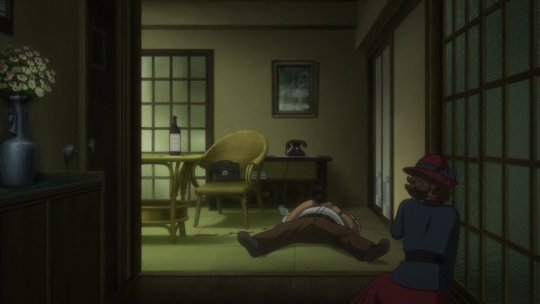
Note how strict Odagiri is with himself. If the guy committed suicide like the note says, there was little he could do to prevent it. Even if one of the girls had gotten in and… let’s say, then shoot him there would have been little he could have done. Yet he thinks this is an inexcusable failure.
The scene changes again (but we still have the same musical background) and we move back to D Agency. On the screen appears the writing 1939, Spring. Yes, we started this anime series with an episode placed in 1939, spring, and we end it going back to 1939, spring. It’s sort of coming to a full circle. Actually it will be a coming to full circle as we’ll discover at the end of the episode.
And now we’re shown a picture of the corpse, only in the photo he’s not a corpse yet. It’s a not so subtle way to tell us we’re going to talk about him now and yes, Odagiri’s voice starts to talk about the deceased. Also, the picture shows him clearly while he’s doing journalist work. Why this is smart?
Odagiri tells us he was a writer for Berlin Allgemeine. He doesn’t explain what Berline Allgemeine is, but since Schneider is apparently writing on a notepad info from an interview, other journalists around him making questions and taking picture we can easily figure this is not a… let’s say a cooking magazine.
And now we move from the photos (which Odagiri took) to Odagiri himself. It’s a nice visual choice, especially because we see Odagiri when Odagiri says Schneider was suspected of being a (double) spy… like Odagiri is a spy.
Odagiri now tells us what happened on the day in which Schneider died and his day seems normal enough only it’s actually all hints. Schneider brought flowers from a street vendor (and it’ll turn out the street vendor was actually one of Schneider’s spy contacts) and headed for the apartment of Nogami Yuriko, his lover and a theatre performer. And now we know who was the girl who ran away screaming. Odagiri tells us Schneider and Nogami met a year ago THROUGH A FRIEND OF NOGAMI (yes, the one who’ll kill Schneider out of jealousy).
Note that, as Odagiri speak, we see Schneider buying the flowers and Odagiri following him, then the man goes into Nogami’s house and Odagiri spies him from the opposite apartment.
It’s relevant to note how evidently Schneider spent a lot of time at Noriko’s since Odagiri took possession of an apartment in front of it. Well, Schneider isn’t just her boyfriend, he’s the one who even furnished Yuriko’s house so...
Odagiri goes on in his story and explain how Nogami was out that day but came back with her friend, Yasuhara Miyoko, after 3:00 PM as they had arranged to eat cake together. As he says so we see the two women walking closer and then entering in the apartment in a rush under Odagiri’s gaze, which, but maybe it’s just me, seems more focused on following Yuriko than Miyoko.
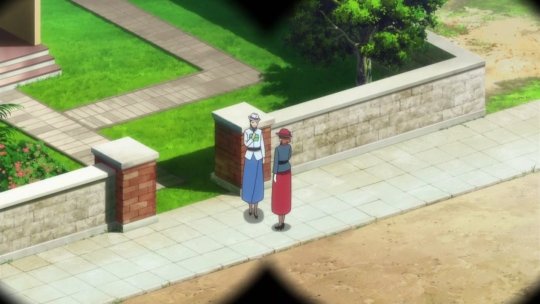
Let me digress a moment on Yuriko and Miyoko’s look. Note how Yuriko’s skirt is blue and Miyoko’s is red, how Yuriko’s jacket is clear and Miyoko is darker, how Yuriko has dark hair while Miyoko has clear one. They’re set up to be visually opposite. Remember how when discussing Ep 1 I mentioned how people found hard to distinguish the spies and how I commented this was a deliberate visual choice? Here we see how the anime was completely capable to make two relatively similar characters (women, with similar looking clothes) could actually stand out as different. We won’t mistake Yuriko for Miyoko and vice versa.
Next we see Schneider’s face. He looks clearly dead and this visually explains why the girls rushed in the apartment. Odagiri then comments that the police thinks Schneider’s death is a suicide. As Odagiri says so we’re shown the suicide note, which is a subtle way to explain us why would the police think so and then we see again the scene Odagiri should have seen when he went to see the inside of the apartment, Schneider lying on the ground, dead, and Yasuhawa Miyoko sitting on the floor, a subtle reminder she remained in the apartment alone with Schneider and could have altered the place. The vase with the flowers is also visible.
We’re back to D Agency the camera focusing on Odagiri and then moving away from him so as to include Yūki as well (and all the other boys seated at the table) as Yūki asks him if he thinks Schneider could have committed suicide because he figured out Odagiri was spying him and thought he had no chances to escape.
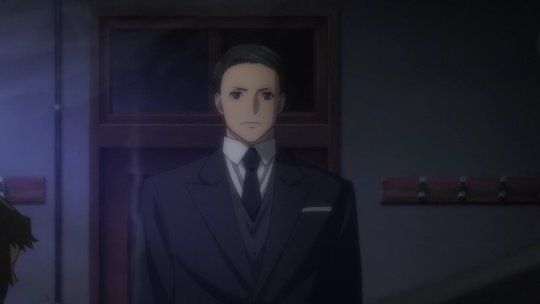
The camera continues to back walk from Odagiri as Odagiri shoots down this possibility, subtly including in the screen the other D Agency members, who’re seated at the same table at which Yūki is seated.
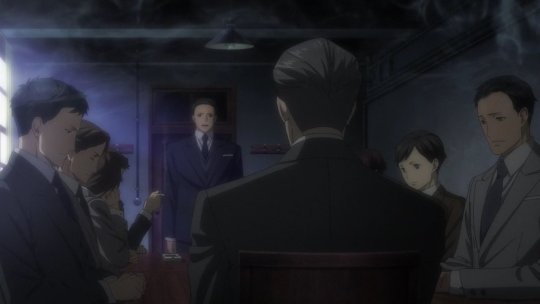
It’s a visual hint they’re going to start to be involved in the action as well. In fact they start with pointing out things. Miyoshi asks Odagiri to explain the suicide note (since Odagiri rejects the idea it’s a suicide) and Jitsui points out (for our benefit) to how the handwriting was Schneider himself. So Kaminaga asks him if Odagiri believed Schneider was killed by someone else and the note was forged. It might seems hard to believe for us (and has someone noticed this would be a closed room mystery?) but Odagiri’s reply helps us to put things into perspective so that Odagiri’s idea doesn’t seem dumb.
Schneider is a double spy, Germany or Russia could go after him. Actually we saw in Ep 6 how Russia killed people who were betraying them... and if we think that’s someone that powerful and possibly well trained, after 11 episodes seeing spies doing amazing things we can accept that yes, someone could have gotten in, killed Schneider and forge the note easily.
Hatano though reminds us of a detail. Odagiri, who’s also an amazing D Agency spy, was surveying the place. If a foreign spy/killer had tried to do all this, well, maybe he could have technically done it but then someone like Odagiri would have had noticed him trying to snuck in (or out).
A couple of words on how the scene is viewed. While the camera is over the D Agency students when they speak, it’s not so below to Odagiri (just barely) we can feel the anime is trying to remark a difference in moral position as it did in EP 1 with Sakuma and the D Agency members. The difference in placement is more because we’re meant to see things from Odagiri’s eyes, a bit like how, when we saw Miyoko and Yuriko, the visual was making sure to let us know that what we were seeing was the same Odagiri was saying through his binoculars.
So let’s go on. Yūki asks how Schneider died. There’s to note that, so far, even if Yūki has spoken, we never clearly saw his face. Even now, his question is made while the camera is showing us Odagiri’s face and, although when Odagiri will reply the camera will look in Yūki’s direction, the camera is high over all of them (Odagiri included) and Yūki is the farthest from it and looking down. We can’t really say we see his face. As for the visual… my feeling is that we get such shoot when Odagiri answers like that (Schneider died of asphyxiation from cyanide poisoning) because that’s a neutral info given by whoever did the autopsy that’s sort of looming over them.
On a sidenote… the big table around which the D Agency students are… is actually formed by four tables put together. I guess in the anime they’re still a bit short on budget so they can’t buy a big one.
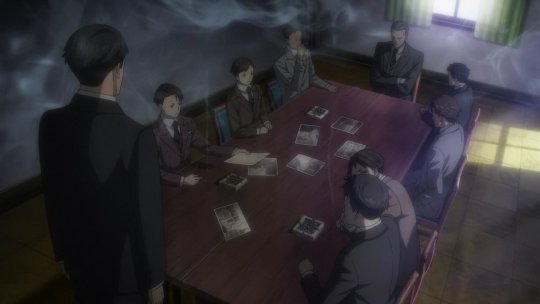
And so now we finally see Yūki’s face. It’s his profile and not from Odagiri’s point of view and it’s on an even level. Yūki’s eyes are closed, a hint he’s deep in thinking. At this point Yūki makes the question that, to Yūki, basically answers to how Schneider died. Yūki asks Odagiri if he’s saying that, when Schneider died, he didn’t notice anything.
We’re shown Odagiri’s profile and, from the look on his face, we can see he feels as if this is a scolding. Remember how he felt his mission ended up with a failure?
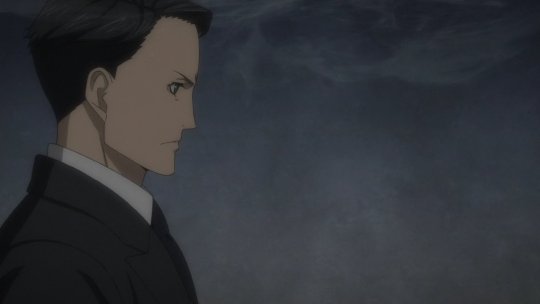
In truth, Yūki likely isn’t so much interested in scolding him, just in making sure that’s the case. Yūki trained him so it should be technically not possible for Odagiri not to notice anything. If he hadn’t something had distracted him and Yūki knows the only thing that could have distracted him. Sadly, due to the many changes between the novel and the anime this point works on a different level compared to the novel, but it’s still worth something. Yūki, in this precise point, figured out how things went (in the novel he figured out only who was the culprit, but was missing some details, here he has them so he clearly figured out how things went).
Back to the story. After showing us Odagiri looking uncomfortable the anime shows us the other boys… or better only the lower half of their smiling faces. The eyes not only aren’t shown, but there are shadows that implies they’re also kept in the dark. We’re back to Odagiri’s perspective. The other spies are just faceless to him, people who’re making fun of his for his own inability. Though he held his ground during the discussion, the atmosphere is clearly oppressive to him and he feels nervous, inferior. They aren’t his friends, they’re there to judge him and make fun of him.


It’s a bit like how Sakuma saw all the spies smiling when he realized he would have to commit Harakiri because remember? This episode traces quite a bit of parallels with the ‘Joker Game’ episode.
Also something worth mentioning is how the room is filled with smoke. The three ashtrays are filled with cigarette butts, though we see only Miyoshi, Kaminaga and Fukumoto are smoking. Evidently the others had been doing the same previously. The room is as foggy as the kitchen was when Sakuma was playing the Joker Game.
Yet, I don’t think the others are there to really make fun of him and they hadn’t even figured out things like Yūki did as they don’t know about Nishiyama Chizuru and aren’t in Yūki’s league. Actually, later on, we’ll see they aren’t even there to make fun of Odagiri as some of them will try to find elements that can support Odagiri’s theory.
Meanwhile the camera is now high over everyone. We’re practically looking at them from a point high above them all. Enjoy the oppressive and still atmosphere as Odagiri doesn’t know what to say.

The music in the background stop abruptly and, while we see Odagiri’s eyes looking down, Amari starts speaking. He picks up a photo and asks if Schneider was fluent in English. The camera moves on the photo he’s looking, the one of the suicide note and we see that, on its corner, there is a really small sign.
The musical BGM is now ‘Seion’ [静穏 Quiet].
Tazaki wonders, like we could do, if it’s just from testing the pen.
Amari agrees it could be that but we get a close up of that small sign and so we can see that, as Amari will say later, that small sign looks like two X, side by side… which might not tell much to us and, especially to Japanese viewers but Fukumoto comes to everyone’s aid by pointing out that in English double-cross means to betray so it can be that Schneider betrayed someone or was betrayed by someone.
As Fukumoto says Schneider might have been the one who betrayed someone the camera goes on Yūki. Maybe this is a hint that Yūki figured out that Schneider dumped Miyoko in favour of Yuriko and this pushed Miyoko to kill him. Maybe not. The novel and the D no Maou manga can’t help us to figure out things as, in them, the solution to the case is pretty different so do your pick.
Amari asks Yūki what does he think in this regard.
Yūki finally opens his eyes, which is a hint he has finished thinking and has taken a decision and starts issuing orders. They’ll let the matter slide and prioritize taking control of Schneider spy network. He then assigns jobs to all the boys. As soon as he issues an order, the boy mentioned stands up and walk away to fulfil his mission. As the boys leave they pass next to Odagiri. They’re smiling.
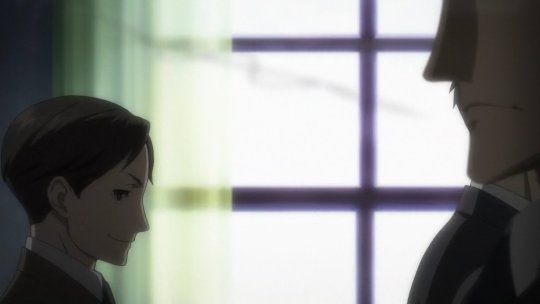
To Odagiri, as he stand there, frowning, their smiles likely feels like malicious smiles of someone who wants to make fun of him but I’m not so sure that’s what behind Fukumoto or Amari’s smiles. After all they offered a possibility for Odagiri’s idea that Schneider was killed by someone else to be true, didn’t they?

To be honest though the audio and the visual are a little off as Fukumoto has already left when Yūki made his name… ^_^;; I wonder if this got fixed in the dvd release…
Anyway Odagiri ends up remaining alone with Yūki. The camera is showing him from a side. We can see that now his head is lowered, is gaze is downcast and he’s sweating slightly as he asks Yūki want he wants him to do.
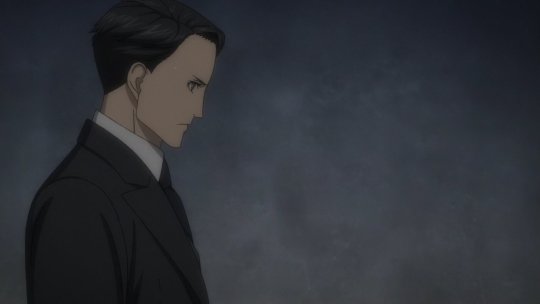
Likely his frowning face was a mask, a way to hide his true feelings from the others. Odagiri is uncomfortable and clearly feels like he failed. He tried to be tough when the others were there but now… we can see he’s not so tough. He even hesitates slightly when speaking to Yūki…
Yūki is also shown by his profile. Him and Odagiri are sort of in opposition, though it’s not like we’re one against the other. It’s just they’re in opposite places, the spymaster and the spy under him who has failed to accomplish his job.
Yūki is shown with his eyes closed. This sort of hint he’s thinking. Since Yūki evidently came to a conclusion on what had happened he’s likely not thinking at the case, but more at what to do with Odagiri, how to shape the order he’ll give to him. We see him opening his eyes and, as the BG music ends, the camera shows us a close up of his face. It’s the sort of scene that tells us Yūki is in control here, that he’s the supreme boss. He tells Odagiri to investigate the woman that was at the scene. Note that he doesn’t make the name of the woman that was at the scene and that actually there were TWO women at the scene. Odagiri is surprised and starts with saying ‘but she…’.
We won’t know what will happen afterward as the scene will switch, but it’s clear that when Odagiri started speaking he had already decided to which one of the two Yūki was referring. Let’s note that Odagiri knew it was Miyoko who introduced Schneider to Yuriko so BOTH women had a connection with him, even if us, viewers, don’t know yet. It’ll turn out though, that Odagiri immediately assumed Yūki was talking about Yuriko.
While this could be due to the many changes between novel and anime, let’s pretend it’s planned. Overall this would mean that Odagiri instinctively defended Yuriko. Yūki’s sentence was meant to be ambiguous on purpose. Yūki figured the culprit is Miyoko but Odagiri is so focused on Yuriko he only worries about her. It would be a nice psychological touch. But well, as I said, the scene switched before Odagiri had the chance to end his ‘but she…’ sentence, so let’s see what happens afterward.
‘Tōryaku’ [韜略 River] starts being played.
Night or very late in the evening. While the camera shows us the Shinjuku Akakaze theatre, we can hear Odagiri’s thoughts and they tell us that Yuriko has an airtight alibi. It’s now that us, viewers, learn he was thinking about Yuriko. It doesn’t come as a big surprise to us as, while it was possible to assume that Miyoko was the friend that introduced Yuriko to Schneider, at the moment we’ve no idea about this so Miyoko feels unconnected to the case… even if actually, if we are to accept that Schneider was killed by a killer or another spy, we should suspect of her all the same.
Anyway, Yuriko was busy with a dress rehearsal when Schneider supposedly died and was never off stage for more than five minutes. As we hear this we see that Yuriko is at the theatre, acting. The BGM is the one of the theatrical piece, a violin playing a sad melody.
Her role is fundamentally a sad one. She’s a flower girl, the man she loves buy flowers from her to hand them off to another girl. He tells this other girl that, although he has to leave and might not come back, he’d like for her to wait for him and the girl, which is impersonated by Miyoko, says she will.
As they embrace Yuriko tells that she loved that man so much she is okay with him to be happy with the other girl and that she is willing to disappear from his life even if her life will be one of darkness and solitude as this will be a proof she lived. She says so smiling.
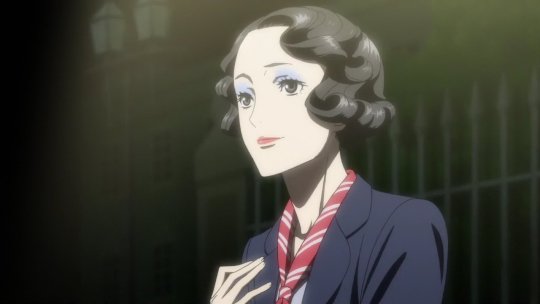
The story of the theatrical piece might seem irrelevant right now, just a sappy love story, same as Yuriko delivering her lines with a smile. We’ll learn of its importance later on.
Anyway the play ends and the scene switches.
We’re in what is a dressing room, which is filled with flowers of various types (this episode definitely has a flowers theme), and everyone in it is focused on Miyoko, praising her.
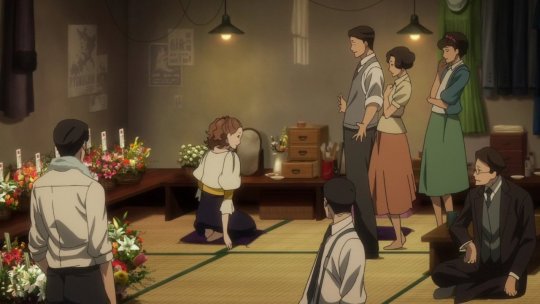
Miyoko thanks for the praises but claims Yuriko was the real star in spite of what happened. The visual shows us that Miyoko turns on a place that was likely Yuriko’s spot, only it’s empty and there are only the clothes Yuriko wore during the representation, a sign Yuriko has already left.
While one might assume from this that Yuriko has gotten over Schneider’s death, as Miyoko speak we see that Yuriko is actually standing in front of the signboard of the play with a sad expression on her face and a troupe member, who’s likely talking with Miyoko, wonders if Yuriko is all right.
‘Yōkō’ [陽光 Sunshine]starts being played, though at the beginning one might think this title isn’t really fitting…
The visual shows Yuriko’s sad face reflected on the signboard and, on the corner of the signboard that’s visible the tiny draw that represent the character Yuriko acts in the play. The connection between the two starts to get more obvious. Now that Yuriko has lost Schneider (even if not to another woman) now a life of darkness and solitude awaits her as well.

She leaves, her head lowered, and we can see Odagiri looking at her from behind a corner. Hum… okay, they might exchange him for a fanboy so it could still not be overly relevant but really, it’s quite obvious how Odagiri was staring at her here. That’s not good for a spy, Odagiri…
Odagiri’s expression is sad, as if he was sharing Yuriko’s pain.

The scene switches to show us a flower field and two figures walking through it, a woman and a child, holding each other hand.
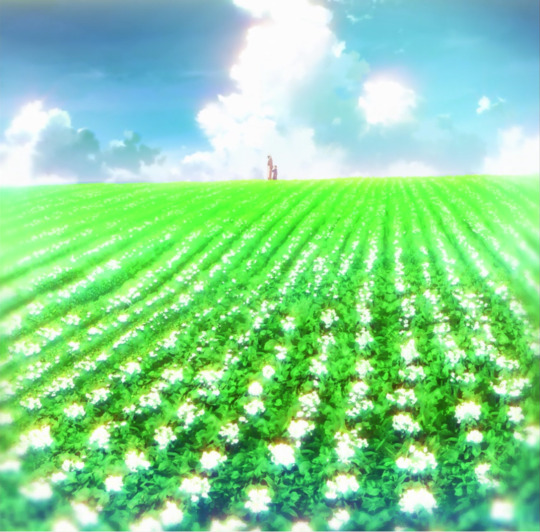
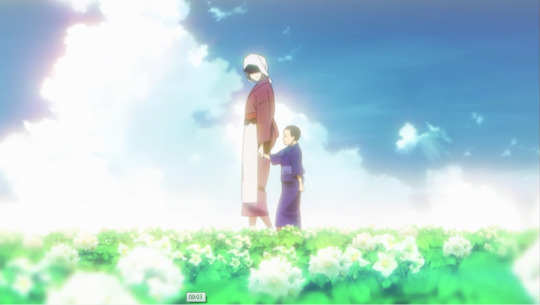
We can’t see the woman’s face, a hint that so far she’s a stranger to us…
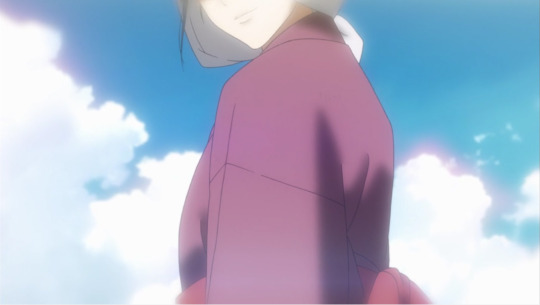
…but the child smiles adorably at the woman and then the two walk away. It’s here that the BGM title seems fitting. Also, the whole scene is honestly beautiful, one of the best of the episode.

As the two figures are about to disappear, a voice says ‘excuse me, sir’.
We comes back to the present to see that Odagiri is startled. The voice was speaking to him and now it’s clear what we saw before was his memory and he was the cute child. That person asks Odagiri if is anything the matter. Really, Odagiri isn’t acting at the best of his abilities as he let himself be caught on staring at Yuriko by someone who was behind him and that he didn’t even realize coming closer.
This is a HUGE hint that Odagiri might have missed clues on what happened to Schneider because too focused on Yuriko to take notice of everything else.
Anyway the person speaking to him is someone who works at the theatre and he’s carrying flowers that admirers sent to Yasuhara Miyoko. Actually, apparently all the flowers placed there (there are a lot and of many types) are for Miyoko so Odagiri hurries to assure he’s all right and quickly switches the topic claiming, while starting at them, smiling, that Yasuhara-san is quite popular.

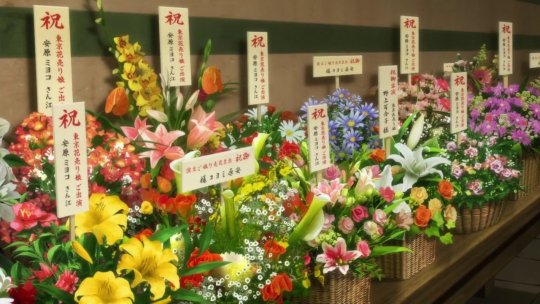
The guy thanks him and claims that Miyoko got better and better until she became their marquee actress. Odagiri asks him if the flowers he’s carrying are for Miyoko too and bends down to sniff at them, claiming they’ve a calming scent.

The man confirms, stating they’re Miyoko’s favourite flower. He then adds that the flowers, after a while, are handed off to a nearby florist.
Note that Odagiri sniffed the camomile but those weren’t the only flowers the man was holding, there were also roses and other types of flowers… all for Miyoko.
All this discussion seems pointless and just Odagiri’s way to distract the other from how he was staring at Miyoko… but it’s actually all something we’ve to keep in mind as it’ll turn useful later on.
Odagiri leaves the Shinjuku Akakaze theatre while ‘Seion’ [静穏 Quiet] starts again being played in the background and we see him walking through the streets. When he stops to a crossroad someone that was seated there starts on speaking to him before walking away. It’s Hatano that reports him on his finding in regard to the suicide note, which he investigated as Yūki asked him. He’ll cross other D Agency members, who all will make their report to him in a similar manner (speaking as they cross him then walking away). We see that Odagiri grows uncomfortable at this.
In the end, when Miyoshi reports that nothing unusual is going on at the German and Soviet embassies but someone new might have taken over Schneider’s spy network, Odagiri snaps.
The BGM pauses as Odagiri grabs Miyoshi’s shoulder and forces him to turn, angrily asking him why he’s reporting to him.
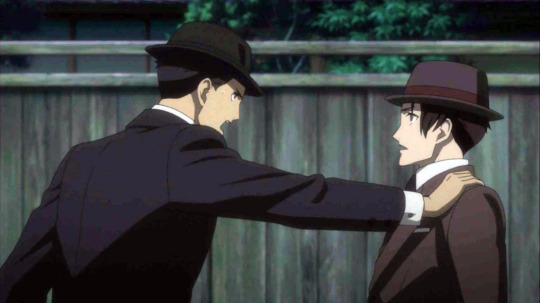
It’s like he’s feeling mocked by their actions. Miyoshi is clearly surprised by his action, a hint that this was not the case and that he doesn’t even get why Odagiri is asking him that.
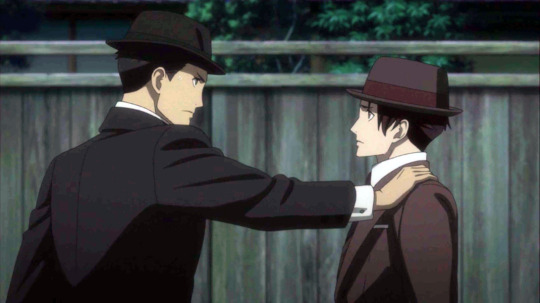
Then, he frowns and angrily pushes away Odagiri’s hand…
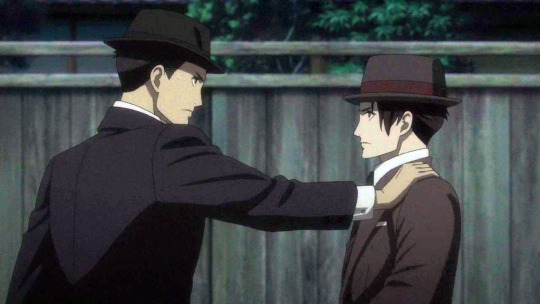
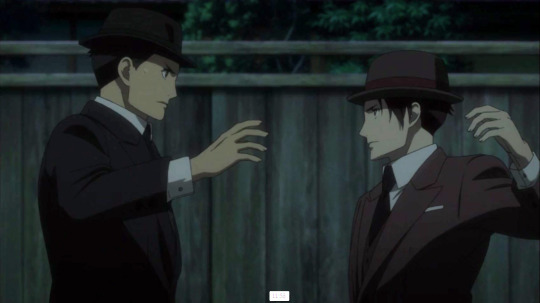
…informs/reminds him that this is HIS case…
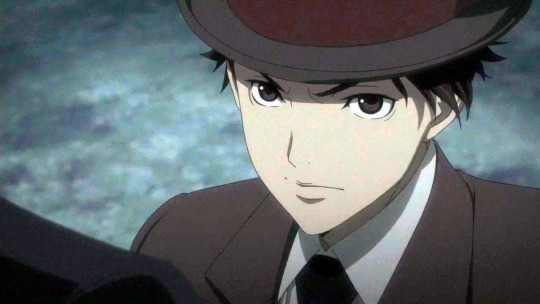
…surprising Odagiri as he evidently hadn’t realized this is (still) his case.

As ‘Seion’ [静穏 Quiet] resumes on being played Miyoshi walks away, leaving a surprised Odagiri standing there thinking ‘my… case?’.
It’s either morning or afternoon and ‘Yōkō’ [陽光 Sunshine] is playing in the background. The florist is taking away the flowers from the theatre. Let’s give this guy’s back a good look. Isn’t he dressed in the same way as the florist from which Schneider bought flowers in Odagiri’s memories?
Anyway, attentive viewers might have noticed there was a car parked at a short distance, half hidden by a building, and that the car started moving when the florist left, a hint that the car was going to tail the florist.
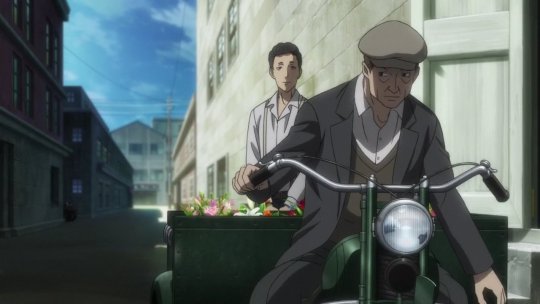
Although we’re back on evening/night and to the Shinjuku Akikaze Theatre ‘Yōkō’ [陽光 Sunshine] continues being played.
We move to the dressing room and to Yoriko, already in her acting clothes, staring sadly at a photo of Schneider and herself together before being told she should get ready to go on.
We’re again in the theatre and they’re again playing the same scene we saw previously. At first it can seem an annoyance to see the same scene being replayed but then, as Yoriko is making her monologue, she stops talking, her mouth open and trembling as if she were finding hard to say what she had to say.
The visual shows us that the viewers are surprised and that Miyoko slightly opens her eyes. It’s a hint that something is wrong, that things aren’t going as planned. We see that a tear trails down on Yoriko’s cheeks and then she falls on her knees, weeping. She manages to finally say her line but we know that previously she saw them smiling so we know that her tears aren’t an act. She spontaneously couldn’t help but start crying.
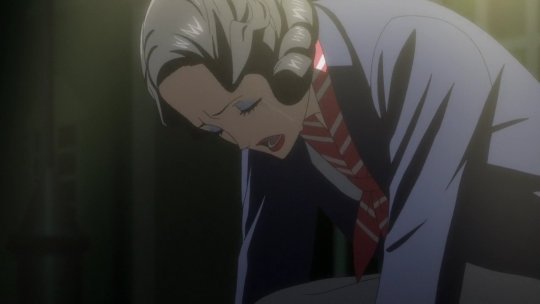
The viewers don’t realize it as her tears too can fit the mood of the scene and start clapping.
A door open and someone is leaving the stall. It’s Odagiri, who’s walking alone toward the exit. He pauses as Miyoshi’s voice comments that Yuriko wasn’t the murderer in Schneider’s case.
We see that Miyoshi was behind him, leaning on a wall. It’s hard to say if Odagiri deliberately pretended not to notice his presence of if Miyoshi managed to surprise him because Odagiri was still distracted by Yuriko.
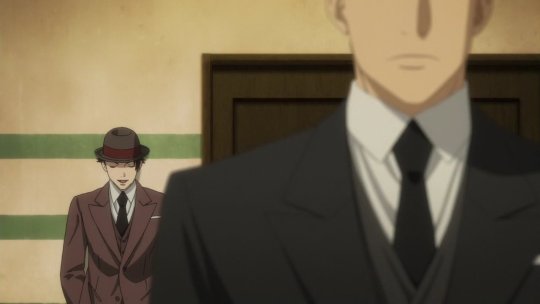
Anyway Odagiri agrees with Miyoshi claiming no actor could fake such tears. Then he turns to Miyoshi and demands to hear his report on what he found about Schneider’s accomplices. Odagiri is calm and in control here, quite a difference from his last meeting with Miyoshi.
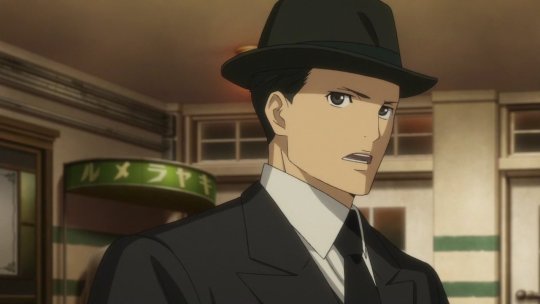
Smiling Miyoshi tells him it was exactly as Odagiri thought.
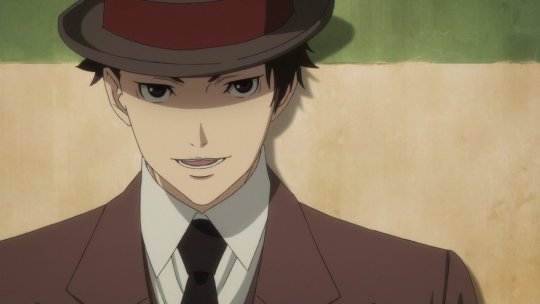
Evidently he isn’t angry that Odagiri was right in his theory making even though when Odagiri reported to D Agency he questioned his suggestion and, later, he got angry when Odagiri asked him why Miyoshi was reporting to him.
But let’s go back to the story. As ‘ Yogiri’ [夜霧 Night fog] starts playing, Miyoshi explains he tailed the florist… so he was the one on the car which moved after he left the theatre. The guy stopped at what looked like a florist shop but was actually a secret post for Soviet spies to exchange intelligence. Miyoshi says they communicated in code using a specific flower. A flashback shows us it’s the flower Schneider bought before dying, the chamomile.

The flashback also confirm that the florist who took away the flowers from the theatre was the same that sold the flowers to Schneider.

Miyoshi goes on claiming two spies made contact with Schneider, one was the florist, the other was…
Odagiri ends the sentence for him, claiming it was Nogami Yuriko’s friend, Miyoko.
Miyoshi asks him what tipped him off and Odagiri turns away from him as he claims it was simple. He just connected the scent of flowers that was in Nogami’s apartment just after the murder with the one of the flowers delivered to Yasuhara Miyoko.
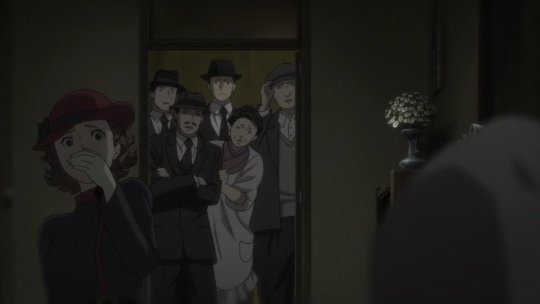

Now… allow me a little digression here. This connection is… a little cringe worthy. I mean… Miyoko had a lot of flowers delivered to her, not just chamomile. Chamomile was only the one Odagiri happened to sniff and her fave flower but she’s receiving so many different flowers that at this point the connection becomes a little too loose. Whatever flower could ‘draw a connection’, not specifically chamomile. At this point Odagiri could have said she was the only one connected to flowers… only not really because the guy at the theatre was connected to flowers too as he moved around Miyoko’s flowers.
There’s to say thought that, due to the many changes done by the anime, this part is a complete original scene (in the novel the culprit is Yuriko and there’s not flower connection or Russian spies involvement in Schneider’s death) so it’s possible that the problem is simply that the anime authors weren’t as good as Yanagi Koji at mystery writing and ended up making a choice that doesn’t work as well as his own. Who knows.
Odagiri goes on claiming that Schneider planned to become a triple spy, and hand info to the British so the Soviets decided to assassinate him making it look like a suicide. Odagiri is smiling as he says so, evidently liking this solution.
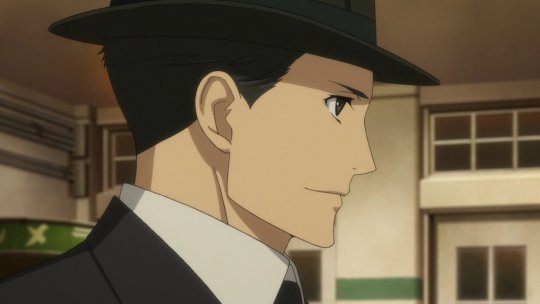
Odagiri explains that in order to make it looks like a suicide they needed Miyoko to be on the crime scene and have some time alone there. This bit too is a bit shaky.
According to Odagiri’s theory, after seeing Schneider dead Yuriko rushed off in panic to the police station… but this wasn’t something Miyoko could actually anticipate. Yuriko could have been so shocked she wouldn’t be able to walk away, falling sit like Miyoko pretended to do. Or, as the novel remarked, could have decided to use the phone to call the police a phone that is well visible in the anime and couldn’t be removed because it needed to play a part in the anime plot as well.
Anyway, according to Odagiri, Miyoko used her time alone to place the suicide note on the table and added the double cross as a message to the English-speaking side (as if to say that Schneider was killed for attempting to betray the Soviets for England).
Miyoshi, still smiling, asks how she got the note as she surely couldn’t have him write it.
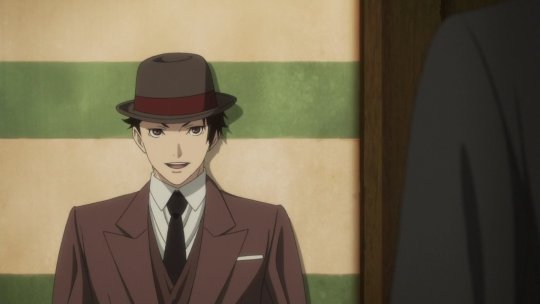
While all this is for our benefit, so as to explain things to us and let us see Miyoshi as he was killed off in the previous episode and we were all mourning him, it feels a bit weird Miyoshi hadn’t figured out. We’ve otherwise to assume he figured out but, for his own reasons, Miyoshi wanted Odagiri to voice it out. Note also how they’re talking in a public place and, since the play has just finished, people should actually get out now… unless a lot of time has passed and Odagiri was the last to leave after everyone has left? Still, people working in the theatre could and should be around. They could be overheard easily. In short although I’m happy this extra scene let me see Miyoshi again… well, it’s not really well planned.
Back to the plot. Odagiri claims it was a hint for the next code they would use… which again is shaky as writing down such code would be risky for Schneider… and, as a spy, he should be capable to remember it without writing it down. Really, for this to work we’ve to assume Schneider sucks as a spy.
Anyway the logic is that Miyoko knew Schneider would be in that apartment (let’s assume they agreed to this previously), called him and told him that what was written on the note is what she would tell him at their next meeting… and that Schneider felt compelled to write it down. Then, Schneider would decide he’ll have a glass of wine… which we’ve to assume Miyoko or someone else managed to poison… and here too the logic is shaky again because Miyoko couldn’t be sure Schneider would drink wine after talking with her at the phone, unless it was a habit of his but we’re never told about this.
Anyway the explanation ends here.
We’re back on D Agency.
We see Odagiri’s profile as he’s standing in Yūki’s office, likely staring at Yūki as the man says he was informed Yasuhara Miyoko confessed murdering Schneider and that the police thanks them, which is quite a rare occurrence. Odagiri seems… just there, as if his thoughts are actually distant. He doesn’t look firm or determinate. He’s… maybe sort of sad, tired, an inner sort of tired, lost in his own thoughts. It’s like he’s looking at Yūki but not really seeing him.
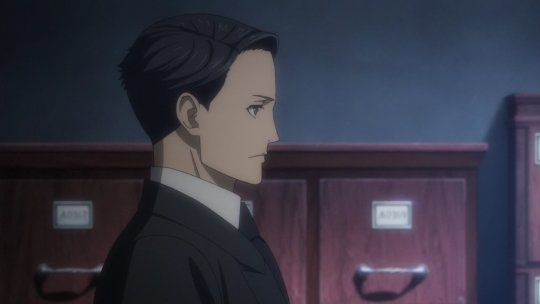
Yūki then asks if Nogami Yuriko resembles Nishiyama Chizuru.
As Yūki says so, we’ve a close up of Odagiri’s eyes. His gaze, that seemed unfocused and emotionless, changes abruptly as his eyes widens in surprise…
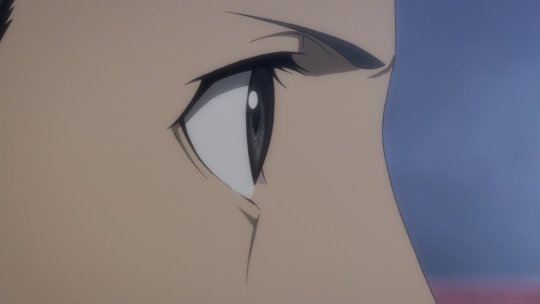
…and then he lowers them sadly as ‘Hifū’ [悲風 Sorrowful wind] starts being played in the background.
Odagiri remembers that, when ordered to monitor Schneider and Odagiri first laid his eyes on Yuriko he couldn’t believe how much she resembled Chizuru. As he thinks so we see a flashback. Odagiri is outside a house, peeking in it from behind a tree through the window. Odagiri must have good eyesight as he doesn’t seem close enough to see the people inside well.

Anyway, Odagiri sees Yuriko seated on a couch and Schneider coming close to her and kissing her. At this Odagiri’s eyes widen. It’s actually the surprise because that woman reminds him of Chizuru but, since he notices this only when Schneider kisses her it feels as if he was affected by the kiss.
Another flashback starts, one with little Odagiri who’s busy drawing or writing something. As we see him doing so we hear Odagiri admitting he never knew his parents’ faces, that he was left with his paternal grandparents but they were so old they couldn’t be expected to care for a child. As he says so we see the grandparents, who’re actually glaring at little Odagiri.
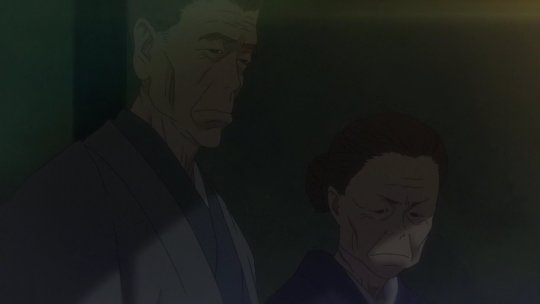
They don’t look like grandparents who would have a hard time looking after a quiet child like Odagiri seemed to be but as grandparents who do not want that child around… which is exactly how they were in the novel. I wonder if their expression is due to some change in the original script for the anime scene.
Odagiri claims due to this it fell on the young daughter of a nearby family to raise him. That girl was Nishiyama Chizuru, the girl we saw walking with him in the previous flashback. She calls little Odagiri ‘Hiro-chan’ and, as soon as little Odagiri sees her, his face lights up. Her face is finally shown and we see she has a striking resemblance to Yoriko.

For Odagiri she was the only one person in the world who accepted him… which hints that the rift between him and his grandparents was a little bigger than them just finding hard to raise a child.
As we go back to the previous flashback of Chizuru and Odagiri walking together, Yūki comments that Chizuru practically raised Odagiri, then eloped with a man who abandoned her and she never returned to her hometown but died of tuberculosis.
Yūki goes on and says that when Schneider died Odagiri said he didn’t notice anything wrong. At this Odagiri raises his head and looks outside the window, to the sky. His expression is… I don’t know, a little dead on the inside, as if he’s longing for something he can’t have, as if he were a trapped man.
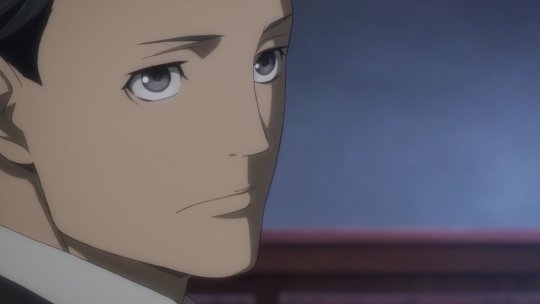

Yūki goes on claiming the only thing that could distract a man trained by D Agency is Chizuru’s ghost so it was a simple deduction.
Odagiri agrees as he claims that he was so focused on Yuriko he didn’t notice the other woman in the equation, Miyoko. We go back to the flashback in which Yuriko and Schneider kiss. The camera moves away from them and we see, among the many people there, there’s also Miyoko, frowning angrily at them.
Yūki then asks Odagiri if he won’t reconsider. The camera shows us Odagiri’s resignation from D Agency.
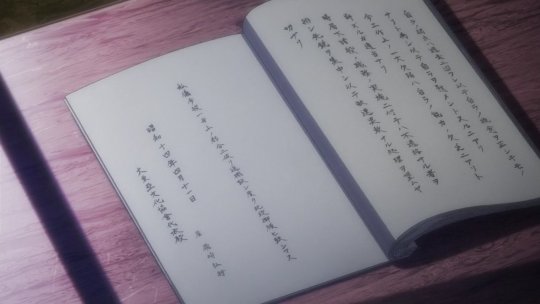
Yūki’s sentence in a way it implies Yūki knows Odagiri won’t reconsider but still he’s offering him the possibility to change his mind. Odagiri merely nods to confirm his decision. At this Yūki asks him if he knows why they don’t accept women and explains that’s because women kills when it’s not necessary.
This too is shaky in this setting (and misogynist as hell as there’s plenty of men who kill for reasons similar to Miyoko or worse and therefore unnecessary… Wind Agency anyone? Oikawa anyone? Yoshino anyone? SMERSH killer anyone? but well, that was a misogynist time…) as Schneider’s death was decided by the Soviets. It might work if Miyoko wasn’t a spy previously and decided to become one only to kill Schneider, like Synthia Grane did (she became a spy… or better an assassin, to kill the man who caused her husband’s death even if this meant betraying her country and risking of losing her child)… but we’re actually told Miyoko WAS a spy working for the Soviets, which decided on Schneider’s death so it’s not like she killed unnecessarily… she obeyed to an order, like Gamo would have done in Ep 9 when he tried to kill Jitsui. The fact that she also found pleasure in that order because Schneider dumped her for her friend is secondary. She would have to kill him just the same.
This sentence would have worked better in the novel (no idea if it’s in it) where Yoriko is the murderer and she killed Schneider because he betrayed her with her friend when she had no problems accepting his other lovers. In that case it was no order that moved her, nor job, just personal feelings.
Odagiri reasons that being completely unencumbered requires not believing in anything else in the world and abandon trivial things like love and hate, betraying what’s in your hearts that supports you and casting it aside and this is something he can’t do as no matter how hard he tries, he can’t rid himself of Chizuru’s memory… or better, if he were to abandon it, he would no longer be sure of his reason for living.
He remembers the other D Agency students and Yūki as they were seated on the table discussing Schneider’s case and admits that in the end he couldn’t become a ‘monster’ like them.
‘ Yōkō’ [陽光 Sunshine] starts playing again and we see that the signboard at the Shinjuku Akakaze theatre is being covered with a writing that says they’ll reopen soon with a new cast. The guy doing this is the same that was carrying Miyoko’s flowers around. Odagiri appears behind him, holding a suitcase in his hand and asks him if Yuriko will not perform any longer.
The guy recognizes Odagiri and then inform him Yuriko quit because after losing her boyfriend and having her friend arrested… well it was a little too much to bear. Odagiri is surprised then lowers his head sadly as he says he understands but then the guys goes on, surprising him when he says they won’t see Yuriko perform again in Japan. Odagiri can’t help but ask where is she going with quite a bit of interest. Turns out Yuriko is going to Manchuria, which surprises Odagiri greatly.

Flashback back to when Odagiri was in Yūki’s office. Yūki tosses an envelope on the table (Yūki’s table too is scratched, I’ve to admit I love those little details in Joker Game)
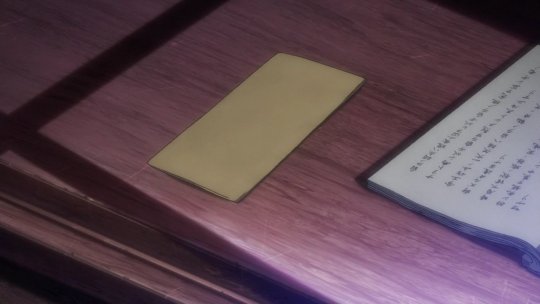
…and claims that’s Odagiri’s dismissal. Odagiri bows slightly (nowhere as deep as Sakuma did as that’s not a ‘saluting’ bow) and Yūki tells him he’s assigned to be a First Lieutenant (he got promoted as previously he was a Second Lieutenant) in Kwantung, Manchuria. Yes, the same place in which Yuriko went. In short it’s not like Odagiri is free to go now, he still belong to the Army, just not anymore to D Agency… but apparently Yūki at least had him assigned to where Yuriko went.
Odagiri takes the letter and moves to walk away, and maybe it’s just me but now he’s walking like a soldier.
Yūki calls him ‘First Lieutenant Tobisaki Hiroyuki’ making him stop and turn in surprise…
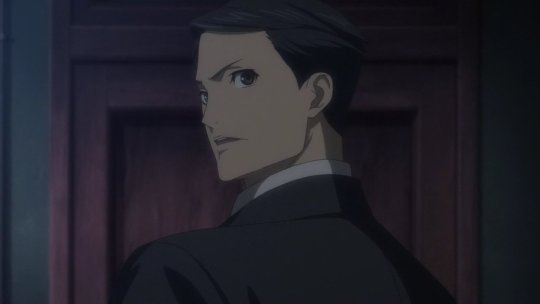
…then Yūki basically orders him ‘Don’t die.’ The scene loses a bit of its importance as while it’s copied from the novel, in the novel Odagiri was assigned to the first line because the Army deliberately used this method to kill off the ones that left D Agency as they knew too much… so Yūki saying so was much more meaningful since Odagiri in the novel faced a concrete risk to die… while here he’s not put in such a dangerous situation… at least at the moment (fights in Manchuria will start in May and this episode is placed in April), so it seems he’s just reminding him part of D Agency’s motto.
Odagiri turns to him, stands at attention and then bows in what is the Japanese military salute, a sign he still took Yūki’s words like an order.

Yūki asks him if he’s stupid and then asks him who bows while wearing a suit. I take it as a hint he still views Odagiri as one of his men, of his spies, even if he’ll be assigned somewhere else.
Of course, for us viewers, the story of Joker Game came to a full circle. Those words were the first that Yūki said in Ep 1 to Sakuma, who just came to D Agency from the Army, and now they become the last Yūki will say to Odagiri, who’s just leaving D Agency for the Army. They’re an anime addition but they make sense in the anime contest as give it a good sense of closure.
And with this scene ends ‘Joker Game’ Ep 12 and the whole ‘Joker Game’ anime series… which I truly hope will be continued anytime soon.
Ending theme.
Overall, while Odagiri’s episode is a good episode… well, I think the changes to the plot didn’t really help the mystery story in it. I still enjoyed the many parallels with Ep 1-2 and the whole idea of coming to a full circle but maybe this episode too would have worked better if they had turned it into a two parts story. But well, I guess it couldn’t be helped. What I seriously mourn in this episode is the absence of Sakuma. This episode takes place short after his own… and in his own it wasn’t said that Sakuma would be assigned elsewhere, so it feels weird to have him completely cut out. Sure, Sakuma wasn’t in this episode in the novel, but with the many changes the plot of the novel underwent adding Sakuma in the background, maybe just standing there during the boys’ reunion or being the one who hands to Yūki the letter that says where Odagiri would be reassigned… or just being there in the study, wouldn’t have changed things drastically. Instead the anime merely had Sakuma go just ‘POF’ and didn’t even include him in the OAV, even if his voice actor is willing to work in Joker Game some more (in the OAV he dubs the cat, Yoru) and Sakuma is sort of an iconic figure in the series as he gets included in all the drama cds (excluding the first as that one focuses on Hatano only) differently from Gamo who’s not part of the drama cd.
So… well, I’m sad he just disappeared without an explanation.
On the opposite side, I’ve to say the anime was a lot nicer with Odagiri than the novel so at least I’m glad for him.
I’m also glad they give Miyoshi a role as our poor Miyoshi didn’t really get to do much in what was supposed to be his episode… and well, it sort of helped us to mourn him, showing his still alive. Sure, we know that this episode is chronologically placed prior to his death but well… it’s still nice to think that ‘Joker Game’ ended with Miyoshi still alive.
And this was Joker Game Ep 12. Thank you to everyone who was brave and patient enough to sit through my long, long ramblings for the whole episode. I hope other people will feel like sharing what they had observed while watching it!
#Joker Game#Odagiri#Yuuki#Miyoshi#Kaminaga#Jitsui#Hatano#Amari#Tazaki#Fukumoto#Sakuma#Tobisaki Hiroyuki#Yasuhara Miyoko#Nogami Yuriko#Nishiyama Chizuru#Karl Schneider#JG XX Double Cross#Joker Game Random Thoughts#Joker Game ReWatching#Joker Game Anime
24 notes
·
View notes
Text
Narrative Strategies W5
I’m actually torn up emotionally that this is our last narrative strategies lesson, I’m not ready to fly the nest yet
You guessed it, chapter summaries
Chapter 9
fully about the letter written by Lanyon earlier on in the book
Lanyon recalls receiving a letter from Jekyll telling him to get a bunch of ingredients from Jekyll’s house and take them to his home where a dude will come grab them at midnight
Hyde showed up (not recognised by Lanyon) and made a potion out of the ingredients
Hyde asks Lanyon if he should stay or leave to drink it, Lanyon replies that he wants to stick around to see what happens
PLOT TWIST once Hyde drinks the potion he turns back into Jekyll and obviously Lanyon is shocked
Chapter 10
Similar to chapter 9, this is in the form of a letter but this time from Jekyll
Jekyll explains that as a young chap he had a double life, having a good and a dodgy side to him
He focuses his scientific studies on this division within himself
The results of Jekyll’s experimentations was a solution or ‘potion’ if you want to be fun, that turned him into Hyde
Hyde basically meant he could do whatever without feeling shame
Jekyll started transforming into Hyde willy nilly and unwillingly so he stopped taking the potion BUT he was addicted so it didn’t take long for him to start up again
Because of that period when Jekyll didn’t take the potion, Hyde was repressed so when he relapsed, that’s when he killed poor, sweet Carew
This made Jekyll quit the potion completely
Now he was transforming against his will and during the day so he needed Lanyon’s help to get stronger doses of the magic stuff
The first problem was that one ingredient was completely run out and eventually when Jekyll got his hands on some it didn’t work the same, leading him to the problematic conclusion that the batch he used in the first place must’ve had an impurity
With his last remaining dose, Jekyll wrote a letter to Utterson explaining how he’s unaware if Hyde will surrender or top himself, but that he was 100% sure Jekyll was over
Reflective essays
We should follow 3 very important rules when writing out our essays:
Discuss the set text and how our screenplays were inspired by it
Discuss our writing process and the creative decisions we made
Discuss how we would film our screenplays
Unlike my blog, I’ll be writing this in the proper academic way, using citations and having a delightful bibliography at the end. The good news is though, it isn’t an academic essay and can be written in the first person since we’re analysing our own experiences.
Victorians and their take on mental illness
The reason we’re looking at this is so that we can get a better grip on the social beliefs that went into Jekyll and Hyde.
Having Jekyll and Hyde be two parts of the same person, which is even told by Jekyll during the story, was birthed from the ye olde Victorian theory that the different hemispheres of the brain hold different personalities. There’s also the reference to hysteria from Lanyon when talking about Hyde which back in the day was a diagnosis given to patients that have weird symptoms that don’t seem to have a cause (thank the heavens for modern science). Similarly to MPD (multiple personality disorder), it was considered a ‘feminine’ disease that usually only women got.
Gothic Horror
Jekyll and Hyde are arguably part of the gothic horror genre, since it slots nicely into those gothic-y themes of crazy landscapes v. imprisonment and re-emergence of the past. The book also shares the exploration of the limits of what is means to be human that the gothic horror genre contains, chatting about internal desires, outside forces of control and perverse sexual nonsense. One other fun little parallel is the use of the uncanny trope, which you can find in the depiction of Hyde and the disturbance he causes to anyone who see’s him. There is one notable difference between the book and the genre though, like Jekyll and Hyde going into the vulnerabilities of women.
Writing dialogue
Dialogue doesn’t need to be completely realistic - we can edit out all the pauses and hesitations
We gotta link that character’s desires into the dialogue
It helps to put yourself into the character’s shoes when writing the dialogue - really understand what would be said in that situation
Sometimes it’s better to go with silence over dialogue - tell a story through actions, not words
Avoid having the characters talk to the audience via heavy and completely unnecessary exposition - dialogue should not be a simple question and answer sesh, it should have an element of surprise and a neat flow
Be ruthless - cut anything that doesn’t advance the plot or reveal something about a character
Tragedy
‘when you lose control and you’ve got no soul...’ - Steps (sorry, had to)
The 5 stages of tragedy identified by Christopher Booker in 2004 and put into context with the book:
Anticipation - You can find this before the book even starts, when Jekyll was a younger lad and not only identifies his dodgy side, but also wants to release it
Dream - For a wee bit, Jekyll successfully lives a double life being good and bad
Frustration - Things aren’t going too fab for Jekyll and he starts turning into Hyde unwillingly
Nightmare - Jekyll caves into the urges to be naughty and turns back into Hyde but ends up murder a guy
Destruction - Jekyll ‘dies’ when he can’t make the potion again and gets stuck as Hyde who then proceeds to kill himself and gets found by Utterson and Poole
Conclusion
Talking about how to write both our essays AND our scripts was absolutely magical, I feel like this was certainly one of the most helpful for me. It was really interesting to talk about the Victorian views on mental illness, and is certainly leading me towards making mental health the key factor in my own script. Between you and me though, I’m still completely terrified to write this thing.
1 note
·
View note